










I am pleased to present Wesco’s 2024 Sustainability Report, in which we detail how we are making a positive impact for our customers, our partners and our communities.
As a leading provider of business-to-business (B2B) supply chain solutions, our team continues to navigate through a mixed economic environment, while managing changing customer buying patterns. Following two years of double-digit sales growth, we set a new company record again in 2023 with 5% growth to over $22 billion in sales. I am incredibly proud of our team and our company culture.
2023 also marked the successful completion of our three-year integration of Anixter. The acquisition of Anixter literally transformed Wesco. This combination not only established Wesco as the clear leader in several of our businesses, but it also mix-shifted our company to higher growth and higher margin end-markets, reducing our cyclicality and increasing our resilience across all phases of the economic cycle. Looking at our performance metrics since the acquisition underscores the extraordinary performance and commitment of the entire Wesco team:
• Met or exceeded our 2022 sustainability goals and set new targets for 2030.
• Synergy capture – far exceeded all our initial operational and synergy targets set at the time of the Anixter acquisition.
• Above-market sales and profit growth – sales increased 30% and adjusted EBITDA increased 89% versus the 2019 performance of the standalone companies, and EBITDA margin expanded 240 basis points.
• Strengthened balance sheet – rapidly de-levered our balance sheet by three turns, one year ahead of schedule.


• Superior shareholder returns – since closing the Anixter acquisition in June 2020 through the end of 2023, total shareholder return was 353% compared to 62% for the S&P 500.
Today, Wesco is much more than a traditional distributor. We are a critical partner to both our supplier partners and to our global set of customers. The combination of Wesco and Anixter, along with our digital transformation, is empowering us to capitalize on the long-term secular trends from which we are well positioned to benefit. We also understand the urgency to develop solutions for the complex problems in a changing world. To do our part we have continued our journey to meet our sustainability goals and again made very good progress in 2023:
Environmental Stewardship: We are making good progress on our 2030 goals which aim to reduce our absolute Scope 1 and Scope 2 greenhouse gas emissions by 30% and our landfill waste intensity by 15%. We are implementing initiatives that curb energy use and minimize waste generation. These efforts reduce our environmental impact, reduce costs, and contribute to our operational efficiency and long-term success.
Investing in Our People: We believe in our employees and their potential to drive positive change. We are committed to fostering a diverse and inclusive workplace, where everyone feels valued and empowered to contribute their talents. This year Wesco launched a campaign called “Ignite Change,” that targeted 3,200 leaders across our enterprise to build leadership capability and to provide tools and resources to help lead their teams through ongoing transformation. We also reshaped our Learning and Development program to adapt to our evolving needs, with a focus on incorporating technology and industry professionals to offer our employees the best resources available. In 2023, Wesco employees spent over 168,000 hours in training, a worthwhile investment in their future and ours.


At Wesco, we are unwavering in our commitment to ethical business practices. Our robust global ethics and compliance program ensures we operate with integrity and uphold the highest standards in all aspects of our business. This year, we saw a significant increase in employee engagement with our program, demonstrating their trust and commitment to ethical conduct. We are continuously improving to address emerging risks and ensure we remain at the forefront of ethical business practices. For example, our internal audit, quality and security teams performed over 200 audits in 2023, ensuring our operations are running in alignment with the standards we set. This commitment is not only vital to our continued success, but is also essential to building trust with our stakeholders and creating a positive impact on the communities we serve. Through company-wide training, we reinforce corporate governance principles and empower our team members with the knowledge and skills necessary to navigate complex ethical dilemmas. This investment in education has contributed to a notable increase in the number of reports to our internal hotline, indicating a growing awareness and willingness among our employees to speak up against misconduct.
Innovation for a Greener Tomorrow: We offer a wide range of sustainable products and services that help our customers reach their own sustainability goals. From energy-efficiency and energy-management solutions to renewable energy, we are dedicated to pushing boundaries and setting new standards for environmental responsibility.
Wesco was again recognized for our corporate responsibility programs. Likewise, our supplier partners appreciated the value in our collaboration, outstanding demand creation and leading service capabilities. We were named one of Fortune’s World’s Most Admired Companies, and this year ranked #2 in the Diversified Wholesalers category. Our company strategy, performance and management were recognized as well. For the second year in a row, we were named the Best Sustainable Supply Chain Strategy, (United States) by Capital Finance International and to The Drucker Institute’s list of the Best Managed Companies in the World.
Wesco was also named Most Innovative B2B Supply Chain Solutions, North America by Pan Finance magazine for the first time this year.
Our journey toward sustainability is ongoing, and we remain committed to continuous improvement. We recognize that collaboration is key to success, and we are actively engaging with our stakeholders to learn, share best practices, and drive collective action.
Thank you for your continued support as we build a more sustainable future for all. Together, we can create a world where progress thrives in harmony with the environment, where communities flourish, and where responsible governance paves the way for a brighter tomorrow.

John Engel Chairman, President and Chief Executive Officer


Headquartered in Pittsburgh, Pennsylvania, Wesco International (NYSE: WCC) is a FORTUNE 500® company with more than $22 billion in annual sales and a leading provider of business-to-business distribution, logistics services and supply chain solutions. Wesco offers a best-in-class product and services portfolio of Electrical & Electronic Solutions (EES), Communications & Security Solutions (CSS) and Utility & Broadband Solutions (UBS).
The Company employs approximately 20,000 people, partners with the industry’s premier suppliers and serves thousands of customers around the world. With millions of products, digital capabilities, and end-to-end supply chain services, Wesco provides innovative solutions to meet customer needs across commercial and industrial businesses, contractors, government agencies, institutions, telecommunications providers and utilities.
Wesco operates nearly 800 branches, warehouses and sales offices in more than 50 countries, providing a local presence for customers and a global network to serve multi-location businesses and multinational corporations. In November 2022, Wesco acquired Rahi Systems Holdings, Inc., a leading provider of global hyperscale data center solutions. Rahi's expertise with complex information technology projects and global presence strengthens Wesco's data center offerings.
In 2023, we integrated Rahi into Wesco’s CSS business segment under the moniker Wesco Data Center Solutions.
With a strong portfolio of businesses and highperformance continuous improvement culture, Wesco develops solutions to satisfy the complex challenges our customers face every day.

As a leader in electrical, communications and utility distribution and supply chain services, Wesco is a one-stop shop for the products and services needed to navigate business complexities and get the job done for the industries we serve.
Our skills, experience and insights enable us to work smarter and build innovative solutions that move our customers’ businesses forward.
Our vision, mission, values and key strategies are integrated throughout our business model and ensure alignment across Wesco’s business units. Our vision is clear: to be the best tech-enabled supply chain solutions provider while pursuing our mission to build, connect, power and protect the world. We believe that realizing this vision depends on the successful execution of our three-tiered strategy, which encompasses our Core5 values.



Extend our industry-leading scale and value proposition.
Further develop our team and culture of excellence. Digitalize and transform our B2B business.
These values define who we are at Wesco and drive how we approach our work. The three elements of our strategy touch every aspect of our business—from how we go to market with our strategic business units, to how we drive efficiency and build our high-performance culture across the organization.
We believe that the successful execution of these strategies, combined with our comprehensive product and service offerings, will provide cost-effective and innovative end-to-end supply chain solutions for our diverse set of customers across our end markets.
Wesco provides best-in-class products and innovative solutions to meet customer needs for commercial and industrial businesses, contractors, government agencies, institutions, telecommunications providers and utilities.
Electrical & Electronic Solutions (EES)

Communications & Security Solutions (CSS)

Utility & Broadband Solutions (UBS)


We have been a leader in distribution of electrical products for over a century. From automation and control to relays, sensors and switches, we have the products and solutions to meet our customers’ electrical needs.
Key Products/Brands/Projects
• Electrical equipment and infrastructure
• Lighting
• Renewables
• Manufacturing components
• Maintenance, repair and operations (MRO)
• Safety
• Wire and cable
• Automation and Internet of Things (IoT)
For more than 40 years, we have partnered with leading manufacturers to deliver comprehensive solutions that provide 24/7 connectivity and enable security and safety in commercial buildings, data centers and other facilities around the world.
Key Products/Brands/Projects
• Network infrastructure
• Security
• Data Center services and solutions
• Wireless
• Professional A/V
• Safety
• IoT
For more than 60 years, we have been serving a diverse customer portfolio in the utility, broadband and industrial segments, with a broad product offering, to help our customers build, operate, modernize and maintain their electrical grids, communications networks and manufacturing facilities.
Key Products/Brands/Projects
• Integrated supply and supply chain services
• Transmission, distribution and substations
• Infrastructure project services
• Broadband and wireless networks
• Power generation and utility scale renewables
• Automation and IoT
• Safety and MRO

Wesco is recognized as a premier distribution and supply chain services company with a history of success in meeting our customer needs and integrating sustainability into our operations. For over a decade, we have been committed to operating responsibly with our customers, suppliers, and the communities in which we operate. Our approach to sustainability is focused on minimizing our own environmental impact and empowering our partners to make sustainable choices.
We set ambitious environmental goals in 2016, and by 2021, we had achieved the majority of these goals. Following the transformational combination with Anixter in 2020, our team set new goals in 2022 for our combined organization looking toward 2030. This included reducing our greenhouse gas emissions (GHG) and minimizing waste. We are constantly improving our data collection and aligning our efforts with the United Nations Sustainable Development Goals (UN SDGs), ensuring our actions have a meaningful impact.
Recognizing the urgency of climate change, we conducted our first Climate Risk Assessment in 2022. This comprehensive assessment helped us understand the potential risks and opportunities associated with climate change, and we expanded our alignment with the Task Force on Climate-Related Financial Disclosures (TCFD) to ensure transparency and accountability. Our TCFD Index can be found at the back of this report. In 2023, we began internal efforts to further align climate-risk reporting to the International Financial Reporting Standards Foundation Climate Standard (IFRS S2).
Lean process management and driving continual improvement are integral to Wesco’s corporate values. These principles are reinforced every day - through daily management in our warehouses, to improvement of


functional programs, to kaizens (a Japanese word for continuous improvement) events conducted by crossfunctional teams. In 2023, nearly 4,000 employees held at least an introductory white belt in Lean, 199 team members earned a more advanced yellow or green belt certification, and 10 employees were trained and certified as Lean Six Sigma Black Belts. In total, Yellow, Green and Black Belts conducted and reported over 800 kaizens.
The Lean principles contribute to our Wesco sustainability programs as employees practice continuous improvement. This applies to operations at our own facilities to the products and services we offer to our customers in support of their sustainability efforts and our supplier relationships as we support them in addressing their sustainability challenges and opportunities.



Reduce landfill waste intensity by 15% across our U.S. and Canadian locations from a 2020 baseline by 2030. Baseline: 0.64
Provide 425,000 hours of safety training and development to our employees by 2030
Reduce absolute Scope 1 and Scope 2 greenhouse gas (GHG) emissions* by 30% from a 2021 baseline by 2030. Baseline: 84,253 MTCO2e
Achieve a 15% reduction in Total Recordable Incident Rate (TRIR) by 2030 from 2020 baseline. Baseline: 0.47
Met and exceeded in 2023
292,033 hours of safety training completed
1% reduction from baseline: 83,357 MTCO2e*
Met in 2022 2023 TRIR was 0.5 6% increase from baseline**
*Reporting and the completion status for our 2030 Scope 1 and Scope 2 reduction goals are calculated by comparing the same sources of emissions year over year across our operations in the U.S., U.K., and Canada. This method ensures a precise measure of our progress towards these goals. This year represents a period of transition as we expand our efforts to encompass a more global perspective on our emissions. For further details, please refer to the Environmental section.
**According to the latest U.S. Bureau of Labor Statistics data available by NAICS code for 2022 shows the industry average for the applicable industry in which Wesco falls was a TRIR of 2.3, meaning our 2023 TRIR of 0.5 is well below the latest data in our industry.
(Source U.S. Bureau of Labor Statistics)
In 2023 Wesco continued to make very good progress on our goals.
• Expanded our primary data for GHG covering 94% of global locations
• Met target for waste to landfill reduction goal
• Increased transparency of our global population
• Provided significant value to customers with our energy solution projects
• Installed additional 192 vehicles with AI safety devices to promote fleet safety
This report includes content identified as material to Wesco and our stakeholders, as well as information intended to meet disclosure requirements aligned with our ESG frameworks. The 2023 Wesco Sustainability Report follows the Global Reporting Initiative’s (GRI) standards and Sustainability Accounting Standards Board (SASB) as well as IFRS standards. Senior leaders participated in the development and review of this report to ensure the content is accurate, balanced and representative of our commitment to be transparent in reporting our economic sustainability involvement, environmental impact, governance practices and social initiatives. We gather data and information from various sources to identify the content and material topics for our sustainability reporting. For this report, we relied on the following inputs:
• Disclosure frameworks such as GRI, SASB, European Sustainability Reporting Standards (ESRS) and Task Force on Climate-Related Financial Disclosures (TRFD)
• Employee surveys and other feedback mechanisms
• Priorities of industry associations in which we participate, such as the United Nations Global Compact and Institute of Supply Management
• Feedback from customers, employees, suppliers, non-governmental organizations and other stakeholders on prior sustainability reports
• Topics evaluated by external ranking organizations, such as CDP, formerly known as the Carbon Disclosure Project, and EcoVadis
• Customer surveys of our sustainability progress
• Insight from our senior leaders
• Our enterprise risk management process
• Applicable government regulations
Supply Chain
Energy
Waste
Emissions
Health and Safety
Supplier diversity
Supplier sustainability
Supplier transparency
Internal energy use
Customer energy use
Waste generated
Internal emissions generated
Employee injuries and fatalities
Employee wellness
Entire supply chain
Customer energy use
Wesco facilities in the U.S. and Canada and local communities in which we operate
Wesco facilities in the U.S., Canada and U.K., customers and local communities in which we operate
Employee and family wellness




Wesco is dedicated to improving our environmental management through setting, achieving, and striving toward new goals. Strong environmental management is an advantage for our business as we implement new practices to reduce our impacts, benefiting our customers and the communities in which we operate. More information on our sustainable client offerings is included in the Sustainable Products and Supply Chain section of this report.
Our Global Environmental, Health, Safety and Sustainability Policy sets the foundation for our efforts. Elements of the policy are aligned with key provisions of the ISO 14001:2015 environmental management standards.
Reduce absolute Scope 1 and 2 GHG emissions 30% for our U.S., Canada, and U.K. operations from a 2021 baseline by 2030.
Reduce landfilled waste intensity by 15% across our U.S. and Canadian locations from a 2020 baseline by 2030.

The policy outlines accountability, direct program responsibilities, key performance indicators and other metrics to track progress and is conducted by the sustainability and environmental compliance team, who report progress to senior management monthly. We implement the Plan-Do-Check-Act cycle to ensure continuous improvement in our energy and environmental management efforts.
Wesco has reduced total waste generated by 3%, waste to landfill by 11%, and increased waste recycled by 15%. Target Progress


Completed 2800+ energy management projects with customers covering 74M sq. ft. with the potential to avoid 53,612 MTCO2e.
Wesco has reduced scope 1 and 2 emissions by 1% or 896 total MTCO2e from our 2021 baseline for our U.S., Canada and U.K operations.
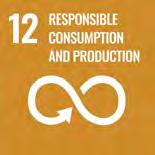
Improved truck fleet efficiency by 11.2% from 2022 to 2023 by increased use of routing software, awareness training and policy.


This report marks a significant expansion in the reporting coverage of our scopes 1 and 2 GHG emissions inventory globally. We expanded our 2023 GHG accounting efforts to include scope 1 and 2 emissions from global facilities adding primary data for 120 additional facilities and 36 new countries, bringing the total to 733 facilities across 39 countries to cover 94% of Wesco’s global locations. Our previous data focused on our U.S., Canada, and U.K. operations, which encompasses 79% of the Wesco footprint and is the boundary for our current 30% emissions reduction target. Moving forward, we will continue to track emissions reductions against national and regional baselines.
*Please note that the 2023 data now reflects our global totals. 2022 data reflects just the U.S., Canada and U.K. businesses.
**Leased fleet data includes combined emission for all car and truck fleet. The 2023 Leased fleet data reflects our updated goal and 2021 baseline as described on page 20.

Since we expanded our scope 1 and 2 data to add emissions from 733 facilities across 39 countries, our total reported global scope 1 and 2 emissions increased by 4% in 2023 from our 2021 baseline for our U.S., Canada, and U.K. facilities. However, the GHG emissions associated with the baseline countries in fact decreased by 1% from 2022 to 2023, despite a 7% increase in total facility square footage to support business growth.
Our scope 1 and 2 emissions are generated by three primary sources: electricity use, building fuels and our transportation fleet – both owned and leased. Among these, the largest source of these GHG emissions is the electricity and natural gas used by our facilities, which accounts for approximately 67% of our combined scope 1 and 2 emissions. As such, building energy efficiency initiatives and process improvements are a key focus of our emissions-reduction activities.
In addition to expanding our inventory to account for global emissions, we continue to make strides towards enhancing data accuracy with increasing the use of primary data. Where primary data is not available, estimates are made using data from the Commercial Buildings Energy Consumption Survey (CBECS) for global sites to have a more complete view of our emissions. We’ve improved data accuracy for our fleet emissions calculations by replacing distance data with fuel data.
To improve our scope 2 emissions calculation, we continued our transition to market-based data collection. Our scope 2 emissions now include 58 custom emissions factors which span coverage for over 300 North American Wesco locations. Transitioning to a market-based approach allows Wesco to capture utility provider-specific emissions factors which account for their individual energy mix. As data quality improves globally, we intend to expand the use of custom emissions factors to continually improve the accuracy of our scope 2 calculations.
Identifying new energy-efficient practices is at the core of our business strategy. Most of the energy we use comes from electricity and natural gas for lighting, heating and cooling our nearly 800 branches, warehouses and sales offices in more than 50 countries around the world. Our fleet of approximately 1,300 trucks and 1,700 cars used in our distribution and sales activities consume fuel that further contributes to our total energy consumption.
Approximately 92% of our facility portfolio is leased, which reduces our control over facility energy consumption and adds complexity to meeting our emissions reduction goal. Where possible, we engage with the owners and agents of the buildings we lease to improve energy efficiency. Our greatest opportunity to make an impact is during lease negotiations. We now include energy-efficiency requirements in new building leases. For the buildings we own, we implement various initiatives to improve our energy efficiency.
• In 2021, we launched a lighting retrofit project, replacing lighting equipment in 21 facilities with more efficient technology (completed in 2022). We were able to track electricity use at 19 of these facilities in 2023. Based on these changes, we achieved a significant reduction of over 20% in both electricity use and associated GHG emissions compared to the baseline before the project.
• Energy audits began in 2023 at several sites with plans to expand to additional sites in 2024.


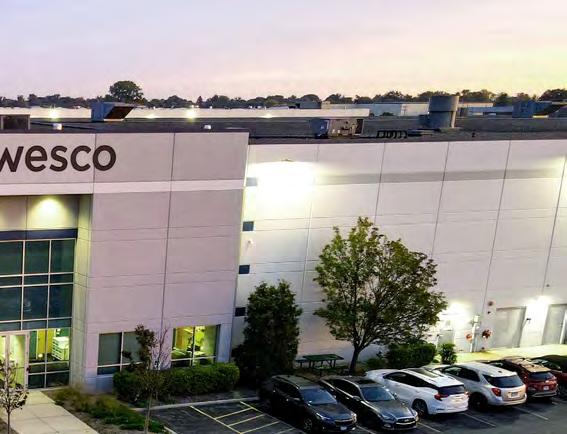
Canada and U.K. data:
*Please note that the 2023 data now reflects our global totals. 2022 data reflects just the U.S., Canada and U.K. businesses.
A secondary source of GHG emissions is from our truck and car fleet. Our Fleet Efficiency Policy includes the use of fuel-efficient vehicles, determining efficient routes and idling restrictions. The policy also provides our teams guidance on driving practices that can reduce fuel use within their truck and car fleets. When purchasing new vehicles, we require an evaluation of the most fuelefficient models available. Locations are urged to retire the least-efficient vehicles first and take steps to improve the efficiency of the remaining vehicles. Future actions are planned to investigate opportunities to upgrade existing fleet vehicles with available technologies to improve fuel efficiencies.
As of 2023, 198 of our distribution centers and branches were using industry-leading route planning software to meet customer delivery dates and eliminate wasteful mileage. For employees who drive either a company truck or car, we provide training on ways to increase vehicle fuel efficiency. This includes accelerating gradually, maintaining proper tire pressure, conducting timely preventative maintenance and using more efficient routes.
Our idling policy requires an engine to be turned off unless necessary for work. Exceptions include engine warmup and during periods of extreme cold weather. Anti-idling technology is part of base vehicle specifications for our full fleet. We anticipate continued GHG reductions since this increased visibility will allow us to implement targeted training at locations where idling performance is poorest.
To reduce energy use and emissions in our car fleet, we are continuing a three-year transition plan to move from employee-owned to company-leased vehicles. Employees in the U.S. and Canada who log more than 7,500 miles in business travel annually can optionally use a leased vehicle rather than their personal cars. Leased vehicles give us more control over our fuel use. We continue to explore more efficient vehicles, including electric and alternative fuel cars, for this program.
In 2023, we continued pilot testing of electric vehicles. We introduced six trucks into our fleet vehicles across three locations and analyzed their utilization. In 2024, we will continue monitoring this program and evaluate future expansion.
Employee Education on GHG Emissions: The sustainability team developed an online learning course called the OUR (Operational Utility Reduction) Project. The course reviews the basics of GHG emissions, provides an overview of Wesco’s emissions footprint and shares tips on how to save energy and be more mindful in energy consumption while at work. Thus far, 1,069 managers within sales and operations in the U.S. have completed the voluntary course.
*2023 total scope 1 and 2 value reflects Wesco global GHG emissions using both primary and estimates data.


At Wesco, we recognize the multifaceted nature of climate-related risks and opportunities, and have taken strategic measures to address them. As we align with the Task Force on Climate-Related Financial Disclosures (TCFD), our commitment extends beyond mere compliance. The index, featured at the end of this report, exemplifies our dedication to transparently disclosing our approach, assessing risks, and seizing opportunities in the face of climate change. As the global community grapples with the implications of a changing climate, Wesco continues to pursue sustainable practices and innovative solutions that not only mitigate risks but also unlock opportunities for a more resilient and sustainable future.
In addition to this report, further information on Wesco’s GHG emissions and climate risk management can be found in our annual CDP climate change questionnaire response. View our current and past reports here, or on cdp.net.
To reduce energy use and emissions in our car fleet, we are continuing a three-year transition plan to move from employee-owned to company-leased vehicles. Employees in the U.S. and Canada who log more than 7,500 miles in business travel annually can optionally use a leased vehicle rather than their personal cars. Leased vehicles give us more control over our fuel use. We continue to explore more efficient vehicles, including electric and alternative fuel cars, for this program.
In 2023, we continued pilot testing of electric vehicles. We introduced six trucks into our fleet vehicles across three locations and analyzed their utilization. In 2024, we will continue monitoring this program and evaluate future expansion.
As a distributor and services provider, we are not a major consumer of water. Our facilities primarily use water for sanitation, cleaning and irrigation purposes. We track water usage in our locations and use the data to identify unusual consumption patterns that could indicate undetected leaks or excessive usage that requires intervention. For example, our large distribution centers use sensors to detect water leakage and monitor average or excessive water use in bathroom water heaters and ice makers.
We also utilize a third-party system to alert us of abnormally high-water usage to help ensure we are managing consumption responsibly. In 2023, we responded to the CDP water security questionnaire for the third consecutive year and plan to respond annually moving forward.
We transport millions of products around the world each year, resulting in a solid waste stream comprising primarily non-hazardous packaging-related material. Our locations stored a minimal amount of hazardous waste with no spills in 2023.
Our top three waste streams are cardboard, wood pallets/reels, metal and plastic. We also have a minor waste stream produced by paper and batteries. We continually work to find opportunities to reduce each of these waste streams by applying Lean principles. Within our waste stream, we also work to identify opportunities to reuse and recycle. Primary materials for recycle and reuse efforts:
• Paper-based packaging: When making customer deliveries, we take back cardboard when possible and reuse boxes for deliveries. Cardboard that cannot be used is recycled.
• Pallets/wood: We reuse, recycle, sell, or return good pallets to our suppliers.
• Wood reels: Where possible, we work with recycling and refurbishing partners so pallets and reels can be repaired or made into a new product. We also reuse our proprietary INSTA-REEL® reusable wood reels that are returned to us by customers.
• Batteries: We recycled 18 tons of batteries.
In 2022, we developed regional relationships with recycling vendors that recycle non-traditional waste streams, specifically metal and wood, which continued this year. Our locations have access to lighting and electronic waste recycling services offered by third-party vendors. This waste includes lamps, batteries, ballasts, electronics and computer equipment. We continuously look for opportunities to work with local companies that recycle our mainstream recyclables.
*Landfill Waste Intensity is calculated as the metric tons of waste sent to landfills per 1,000 square feet of facility space in the United States and Canada.
A team of Wesco associates recognized a waste reduction opportunity to digitize reports that were previously printed automatically across 300 locations. The team worked together and found an existing software platform that digitally stored the reports which resulted in zero printing and making the information within the reports much easier to find. Prior to this solution, the reports used 10,000 reams or 25 tons of paper per year. Other savings include printer cartridges, decreased printer maintenance and labor costs.
Solution results: Eliminating 476,875 gallons of wastewater and 56,950 lbs of solid waste associate with the production of 25 tons of paper.
Teams from across the globe have been making changes to encourage waste reduction. For example: Chile
Employees recycled paper nationwide with the proceeds from the effort going to a foundation to help children in need of baby bottles.
Asia/Australia
Offices recycled paper, wood, metal and plastic in 2023. Recycling bins for plastic and cans were added at Singapore locations.
United
Employees recycled 113 tons of paper, cardboard, steel, plastic, wood and other mixed recyclables.

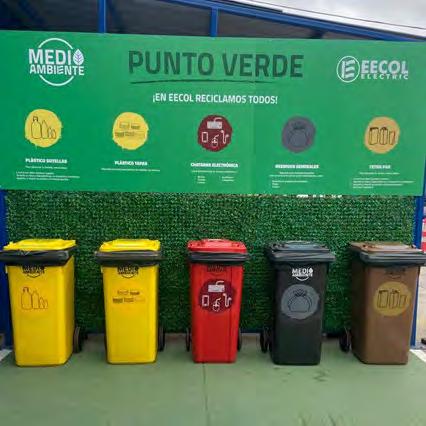


At Wesco, our people are our greatest asset. We are dedicated to offering enriching growth experiences that foster both career and personal development, empowering our employees to make a lasting impact not only within our organization but also in the communities where we live and operate. We prioritize creating a workplace culture that attracts and retains a diverse and highly qualified workforce globally. This strategic approach not only sustains a competitive advantage in an ever-evolving marketplace but also fosters an inclusive and dynamic workplace.
The success of our company is driven by the strength of our team. We develop and nurture a culture that attracts and retains diverse and highly qualified employees to sustain a competitive advantage in our evolving marketplace.
We are committed to ensuring that all employees are managed fairly, ethically and are treated with dignity and respect. In 2023, we published our updated Global Human Rights Principles, formalizing our promise to respect human rights and implementing business practices that align with principles outlined by the United Nations Global Compact, Universal Declaration of Human Rights, UN Declaration of the Rights of Indigenous People (UNDRIP), ILO Convention 169 on Indigenous Peoples, OECD Guidelines for Multinational Enterprises, UN Guiding Principles on Business and Human Rights, and relevant laws in the countries where we operate. Additionally, our Human Rights Policy addresses the following topics:
• Diversity and non-discrimination (see the Inclusion and Diversity section of this report)

• Safety in the workplace (see the Health and Safety section of this report)
• Freedom of association and collective bargaining (see the Governance section of this report)
• Disabled employee accommodations
• Harassment prohibition (see the Anti-Retaliation Policy and Business Integrity Line)
• Adherence to laws addressing child and forced labor
• Appropriate working hours, wages and benefits
• Safe and healthy workplace conditions (see the Health and Safety section of this report)
As a company, our practices integrate respect for human rights, both directly within our global operations and throughout our supply chain. Wesco strives to incorporate inclusion, dignity and respect in our workplaces and to honor the various cultures that support our business around the globe.



“Always listen, then act.”
Inclusion is one of Wesco’s core values. We are cultivating a workplace that supports and empowers diversity in all forms. This starts with listening to our employees then acting on their feedback.
At Wesco, that means utilizing our Business Resource Groups (BRGs), where employees build meaningful connections and discuss workplace and external issues. In collaboration with executive sponsors and the Global Inclusion and Diversity (GID) committee, they bring forward tangible ways to enact change.
On a larger scale, the company listens via its annual employee engagement survey. With questions focused on inclusion, it is intended to highlight what is working and where things can improve.
Results are shared with all employees. Business leaders work with human resources and employees to develop action plans. We focus our efforts on survey themes that will lead to the biggest impact for our global team. Employees know we are listening, that we care and where possible, we will act.


Darryl Castellano Vice-President, Global Inclusion, Diversity and Engagement
Inclusion and diversity (I&D) are at the foundation of our high-performing culture. We believe that our dedication to diversity—the many different things we individually and collectively bring to work each day— contributes to building a stronger workforce and a better company at all levels. We seek to understand, respect and appreciate the dimensions of diversity that shape our global employees’ experiences. As such, we consciously work to create an environment that respects and values the diversity of the people and world around us.
• Leverage the experiences and perspectives of our talented workforce to support Wesco’s mission.
• Engage employees and build an inclusive culture.
• Recruit and develop talent that brings new perspectives and thought processes to Wesco.
• Increase representation of suppliers that are owned and operated by teams with diverse backgrounds.
• Support the communities in which we operate. I&D is explicitly reflected in our Code of Business Conduct and other workplace policies.
Wesco’s overall strategy includes an I&D focus and has empowered our business leaders to prioritize the topic. Executive leadership oversees I&D activity, measures results, and holds our leaders accountable. Collectively, teams are working toward a multi-year, enterprise-wide vision on inclusion, diversity and engagement, which interconnects our employees, suppliers and customers.
Our Global Inclusion and Diversity Council is chaired by our Vice President of I&D, who leads a team of senior management members.
In recognition of our I&D initiatives, Wesco has received the following awards for its efforts and achievements.
• Bloomberg Gender-Equality Index (GEI): The index tracks the performance of public companies committed to transparency in genderdata reporting and measures gender equality across five pillars, including female leadership and talent pipeline, equal pay and gender pay parity, inclusive culture, anti-sexual harassment policies and prowomen brand. Companies on the index scored at or above a global threshold established by Bloomberg to reflect disclosure and the achievement or adoption of best-in-class statistics and policies. Wesco was first recognized in 2019 and has been included each year since.
• The 30 Best Companies to Work for Latinos: Each year, Latino Leaders magazine compiles a list of best companies for Latinos, using such criteria as employee diversity, programs to recruit, promote and retain Latinos, employee resource group programs and Latino representation in the boardroom and C-Suite level. Wesco is proud to be recognized as one of the 30 best companies in 2023, which reflects our commitment to diversity and inclusion strategies and advancement.
“Caring for people brings me joy. This comes in a lot of forms – sending a kind note, reaching out on a bad day, offering encouragement and laughs, sitting with a new person at lunch, the list goes on. I&D is all about ensuring people feel included, have a sense of belonging and can bring their whole selves to work. I can help bring small change simply by being kind and caring for people on a personal level and that is profound.”
– Rachel Westurn



Leaders and managers leverage a set of practical trainings and tools to engage employees and share diverse experiences and ideas. We offer 797 different I&D training course modules. In 2023, employees completed an estimated 6,429 hours of I&D training.
Wesco’s BRGs exist to support a culture of inclusion where employees can thrive and strengthen our culture by offering different perspectives, styles, thoughts and ideas. These groups are offered globally and are open to all employees regardless of any aspect of their personal identity. BRG’s support the following:
• Building an inclusive culture and positively impacting employee engagement
• Creating an open forum for the exchange of ideas
• Providing informal mentoring and professional development opportunities for Wesco employee






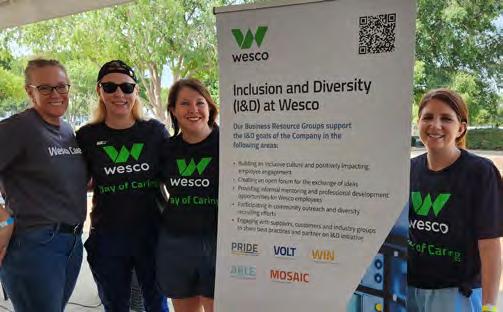
• Identifying opportunities for adding value and growing Wesco’s business through community engagement
• Assisting with the creation and maintenance of a pipeline of diverse talent for the Company
• Engaging with suppliers, customers and industry groups to share best practices, partner on I&D initiatives, advance the industry and to drive business growth has context menu
We continue to expand our BRGs to support inclusion and diversity goals of the company. Feedback from our BRGs provides valuable business insights, aiding our ongoing efforts to enhance diversity.
• ABLE – Employees with disabilities and allies
• MOSAIC – Black, Latino, Indigenous, people of color, employees and allies
• PRIDE – Equitable empowerment of the LGBTQ+ community and allies and promotes a safe, friendly environment for all
• WIN – Women in our organization and industry allies
• VOLT – The engagement of active military employees, veterans and allies
• SPARK – Employees in their early careers, allies and wider stakeholders that empower the expansion of professional horizons
Our talent acquisition team partners with leaders and hiring managers globally to successfully reach our talent goals.
In 2023, our talent acquisition team accomplished or made progress in the following areas:
• Launched a new, comprehensive end-to-end recruiting support model which increased the level of service hiring managers receive to fill open positions. This facilitates sourcing a diverse slate of the most qualified candidates and provides a positive hiring experience to all candidates.
• To ensure a positive hiring experience for candidates of all abilities, we added a statement to our Careers site encouraging candidates to contact us to request an accommodation.
• Conducted deeper analytics of representation across the organization to determine most critical focus areas for targeted recruitment and organizational outreach and partnership, specifically in the areas of females in sales and operations.
• Continued focus on data and analytics and improving reporting to help us understand representation in our candidate pipelines and recruitment process.
• Automated dashboards and reporting will be introduced to provide access to real-time data.
• Ongoing training and development for the talent acquisition team to better leverage existing tools for the purposes of sourcing more inclusive candidate pools.
We continue to partner with organizations such as RecruitMilitary, Department of Defense SkillBridge program, Pittsburgh Hires Veterans and Out & Equal. We post positions on Circa and DirectEmployers Association, to reach diverse job candidates.
As we continue to build our reputation as an employer of choice, we invested in employee onboarding to create a holistic onboarding experience for new employees that is consistent, impactful and scalable. With those objectives in mind, we designed and launched a
refreshed New Employee Orientation (NEO) program in North America, which serves as the official induction to Wesco and covers a high-level overview of our company, our business, ways of working and offerings, and key tools and resources.
In addition, we also enhanced several of our resources to new hires, including:
• New one-stop-shop ‘New Hire Resources’ SharePoint page to help new employees find relevant information.
• Revamped New Hire Onboarding Checklist as a comprehensive guide of essential tasks and activities for managers and new hires to complete to facilitate a successful start at Wesco.
• Updated communications to new hires with improved messaging and branding.
We are committed to making ongoing enhancements to our offerings and have plans to:
• Extend the NEO program to international regions.
• Build supplemental training modules on ‘What does Wesco do’ to elaborate on our business model and strategic business units.
• Create training for hiring managers on employee onboarding to provide a high-level overview of our processes and best practices.
• Digitize and embed onboarding tasks into our human capital management (HCM) system for more automated and seamless task tracking and notifications.
The Talent Center of Excellence (COE) at Wesco is dedicated to enhancing every phase of the employee journey. The COE specializes in a range of areas including talent acquisition, talent management, leadership development and learning and development (L&D). Our primary aim is to identify and secure top-tier talent, bolster our leadership capabilities and ensure our talent is fully prepared to meet evolving needs. This is pivotal in maintaining our competitive edge and supporting our ongoing growth.

Our benefits packages are competitive and include health insurance, well-being benefits and retirement savings. We are invested in helping employees improve their health, wealth, well-being and overall quality of life.
In North America, where private insurance is more common, employees choose the plan and level of coverage that is right for them. Outside North America, where statutory benefits are primary, Wesco offers benefits that cover core employee health and wellness requirements, taking into consideration government or provincial benefits provided. In all countries, Wesco aims to keep fees at or below market, promote positive employee experience and support Wesco’s corporate strategy and goals.


Wesco provides health benefits to all full-time employees including resources for addressing substance abuse, promoting mental health and preventative health.
Wesco practices integrate respect for human rights, both directly within our global operations and throughout our supply chain.
Promoting work-life balance and supporting family leave are fundamental to our workplace culture. We believe in fostering an environment where employees can balance their professional and personal lives effectively. By offering flexible work arrangements and family leave options, we empower our workforce to prioritize their well-being and family commitments, contributing to a sustainable and supportive workplace.
Sustainability Gender Formula
that returned to
Employees employed 12 months after their return following parental leave**
*This data only represents the U.S. and Canada.
**This is the first year reporting on this data and the numbers above reflect those who returned from leave between January 1, 2023 to April 30, 2023 and are still employed through April 30, 2024.
We compensate employees at a competitive rate compared to the industry and local labor market, and we operate in compliance with applicable wage, work hours, overtime and benefit laws. With oversight from human resources and our business leaders, we continually evaluate and evolve our compensation and career progression strategies for employees to improve our ability to attract and retain talented employees while providing a sound structure for employee development and career growth.
Learning and development (L&D) positively impacts Wesco’s performance by delivering targeted solutions that provide the knowledge, skills, and experiences that our people need to be effective, and productive. In 2023, Wesco employees spent a total of 168,522 hours in training, at an average rate of 7.5 hours of training per employee.
In 2023, we reshaped the L&D function to adapt to the evolving needs of Wesco, with a focus on:
• Talent: We hired seasoned L&D professionals with deep expertise in adult learning and instructional design principles.
• Organizational redesign: We reorganized the team structure to remove silos and maximize productivity.
• Process improvements: We redesigned how we work to optimize efficiency.
• Technology enhancements: We provided our L&D team with cutting-edge technology to improve learning quality and efficiency. We also rolled out specialized systems and tools to enhance our employees’ learning journey.
• Learning strategy: L&D priorities were brought into alignment with strategic business goals and initiatives. This included foundational program builds (such as new employee orientation and business unit-specific curricula), sales training, the creation of an operations learning and performance support roadmap, and trainings to support our digital transformations.
To further drive L&D at Wesco, we offer role-based certification and training programs along with a range of online and in-person elective courses and, with the support of their direct managers, our employees also have access to external training resources such as those available through the National Association of Electrical Distributors. We also offer specialized training for specific employee groups, including a summer internship program, a sales, finance and operations development program, and function-specific development programs.
To demonstrate on how to lead every day and align actions to our Core5 values, we have introduced Wesco’s Leader Profile. The Leader Profile serves as a “true north” for employees who wish to advance their individual development by providing a high-level roadmap of what it means to be a successful leader at Wesco.
Wesco has also developed a collective approach to deliver progressive development aligned with enterprise needs: Leadership Essentials.
This program provides individualized and clear development journeys, helping build the leaders we need. In 2023, Wesco also launched two digitally enabled enterprise-wide leadership development programs that follow Kirkpatrick’s 4 levels of evaluation, a globally recognized tool for evaluating the results of educational programs:
• Leading Others: Curated for leaders of individual contributors, or for individual contributors whose role requires they influence without authority. Launched in January 2023, 39% of Wesco’s leaders of individual contributors have participated in this program.
• Leading Managers: Curated for leaders of teams, specific to those transitioning from leading others to leading leaders, this program deals with strategic leadership dilemmas. Approximately 398 leaders have participated in this program.

We believe employee engagement goes beyond satisfaction on the job to include our employees’ willingness and ability to invest their personal efforts into the success of our company. To achieve that, we must create an environment where employees are enthusiastic about their work each day and know that their contributions are valued.
In 2023, we added an advanced survey analytics tool and launched a more formal annual employee engagement survey. Key highlights from the survey include:
• Ethical Conduct: 86% of respondents indicated we have a strong commitment to ethical business decisions and conduct; 7% above the global average. This is critically important to our reputation as a trusted partner to our suppliers and advisor to our customers.
• Health and Safety: 83% of respondents rated safety and our physical working conditions as favorable; 7% above the global average. Our scores for worklife balance were also strong with 80% rating it as favorable: 2% above the global benchmark.
• Manager Effectiveness: Scored 81%; four points above the global average. This means that 81% of our employees have a positive relationship with their manager and feel that they are supportive, respectful, fair and competent. Manager effectiveness is a key indicator of talent management and is considered essential to delivering superior results and developing and retaining talent.
At Wesco, we also use total turnover rate as a key performance indicator for engagement, which was 22.7% for Wesco in 2023.

In 2022, Wesco introduced the WOW recognition program, which spotlights an employee’s outstanding performance and everyday excellence. This platform allows colleagues to acknowledge their peers’ behaviors, efforts, celebrations, awards and results. Our Living Our Values award allows employees to nominate an employee for a monetary award when exemplifying our core values that have a direct impact on the business or the culture.
We reward employee achievements in implementing Lean principles within our company. The Excellence Award for Lean Leadership recognizes the Wesco leader who best embraces and leads the implementation of Lean within their organization. The Lean Execution Excellence Award is given to the top teams that deliver quantifiable results using Lean.
Coaching is an integral part of our culture and has been intentionally embedded within our employee lifecycle, incorporated into our sales operating and conversation models, performance management activities, leadership development programs and Wesco’s Enterprise Leader Profile.
We upskill our leaders by way of coach-specific training accredited by the International Coaching Federation and see this investment in coaching as a regenerative one. When we develop managers and leaders as coaches, those leaders support and mentor employees in growing their capabilities, enhancing their capabilities and reaching their professional goals. In 2023, we increased the number of internally certified facilitators to increase capacity and allow for monthly facilitated workshops.
At Wesco, we take pride in fostering a high-performance culture and our myPerformance program is designed to support managers and their teams in ongoing feedback conversations to drive better results and alignment. The myPerformance program includes annual milestones of goal setting at the beginning of the year and a year-end performance appraisal to highlight accomplishments, share feedback and tie performance to rewards.
We also encourage managers to have ongoing checkins with their teams to provide real-time feedback and coaching throughout the year. Our annual year-end performance appraisal process is synchronized with the workforce compensation system for merit planning and rewards allocation, where the performance rating is linked to our merit guidance, which is in support of our pay-for-performance culture.
We strengthened our Leadership and Organization Review (LOR) process this year both in scope and frequency. The cycle is as follows:
• March: We capture and discuss our organizational priorities and identify talent-related actions.
• July: Each of our executives present their talent review and succession plans to our Chief Executive Officer and Chief Human Resources Officer.
• September: CEO and CHRO review of talent and organization priorities with the Board of Directors.
• October: Our executives come together to calibrate talent development plans and identify opportunities for mobility.
These recent changes have generated additional value across our company by creating an ongoing conversation about our talent, providing tools to better identify, engage and develop our talent, activating conversations related to our critical needs and supporting intra-and inter-strategic business unit function mobility for our talent.


United States
Canada
United Kingdom
Mexico
India
Australia
Chile
Singapore
Peru
Philippines
Ireland
Colombia
Poland
Brazil
China
Malaysia
Belgium
New
United
*Data reflects countries where Wesco has operations with employee populations over 50.
*Leaders are identified as those with positions of Director and above.





*Disclosure of race, ethnicity and gender is voluntary. The final totals above reflect disclosed information only.
Employees

We work hard to keep each other safe. It is the first tenet in our core value of commitment to our people. In our commitment to health and safety, we strive for zero incidents and continuously work towards reducing associated risks. This dedication is reflected in our comprehensive approach to improvement, encompassing dedicated programs, employee best practice sharing, and extensive training initiatives.
At the core of our safety efforts is a robust health and safety management system covering all internal workrelated functions across our facilities, customer locations and corporate offices. This systematic approach involves assessing risks, implementing controls, evaluating their effectiveness, and acting on identified trends through
preventative and responsive measures. Our tracked metrics provide valuable insights for the ongoing performance of our health and safety program. They include near miss reporting, training completion statistics, injury rates and data from key initiatives like ergonomic wearable feedback.
The oversight of our health and safety management system is entrusted to our global corporate safety team, ensuring a cohesive and standardized approach. Every employee plays a pivotal role in contributing to our enterprise-wide safety performance objectives, with individual contributions and actions being closely measured. Aligned with OHSAS-18001 and ISO-45001 guidelines, our health and safety program include the following.
Target Progress
Achieve a 15% reduction in Total Recordable Incident Rate (TRIR) by 2030 from a 2020 baseline.
Provide 425,000 hours of safety training and development to our employees by 2030.
Met in 2022 2023 TRIR was 0.5 (6% increase from baseline)*
292,033 hours of safety training completed
*Data available by NAICS code for 2022 shows the industry average for the applicable industry in which Wesco falls was a TRIR of 2.3, meaning our 2023 TRIR of 0.5 is well below the latest data in our industry. (Source U.S. Bureau of Labor Statistics)


The vigilance of our global corporate safety team is maintained through performance reviews with key leadership, daily interactions with operations leaders, routine KPI reviews, and regular facility audits to verify compliance. Further reinforcing our commitment, each location benefits from a dedicated regional health and safety advisor responsible for overseeing local leadership, ensuring compliance, conducting routine facility audits, evaluating training needs,
planning training calendars, and tracking, trending, and reporting on health and safety metrics.
In 2023, Wesco relaunched our Safety Committee initiative featuring an updated charter and Safety Committee member training. Safety Committees have been implemented at all Regional Distribution Centers, with a target to include all Regional Distribution Centers and Branches in 2024.
*Data available by NAICS code for 2022 shows the industry average for TRIR was 2.3, meaning our 2023 TRIR of 0.5 is well below the latest data in our industry. (Source U.S. Bureau of Labor Statistics)
Management and Supervisory Responsibilities
Define specific protocols for management to support involvement with the program.
Reporting of Safety Concerns
Offers a means for employees to provide input to the health and safety program suggesting any preventative considerations.

Employee Responsibilities
Outlines the health and safety rules employees are expected to follow.
Safety Committee Systems
Outlines the framework of a site safety committee, including the layout of an agenda, membership and method for taking minutes.
Accident Investigation Processes
Establishes process to be followed in the event of an accident or near miss.
New Employee Orientation
All employee’s complete health and safety training as part of their orientation and introduction to their facility.
Enforcement Procedure
Provides a system of actions and outlines steps to be taken if health and safety policies aren’t followed.
Regulatory Compliance
Ensures we communicate relevant information on legal and other requirements to our employees and other interested parties.
We employ a robust risk management process to eliminate potential hazards before anyone becomes sick or injured while at work. Our employees assess work areas for hazards or safety risks and when identified, promptly report them, enabling rapid rectification of potential risk or hazards by supervisors. All employees have the right to challenge any unsafe work situation, and they can do so anonymously. When unsafe work conditions are reported, an evaluation is conducted, and the employee is notified of the action taken to address the situation.
At each location, monthly safety inspections are conducted using a checklist of key hazards and risks. This checklist is regularly updated to include new hazard awareness trends as they emerge. Meanwhile, managers are informally inspecting working activities for safety hazards on an ongoing basis. When a nearmiss occurs, reports are used to create awareness of the conditions or behaviors that can be corrected to prevent future incidents. Lastly, an emergency action plan is reviewed and updated regularly. The plan includes current contact information, logged drills and facility response. In the event of an incident—no matter how minor—we require that it be reported promptly to the frontline supervisor for investigation and evaluation.
Since every incident includes a sequence of contributing risks, it may be possible to avoid a repeat of the first event by recognizing and eliminating these risks. The removal of even a single risk may prevent a recurrence. Our supervisors are trained in incident investigation procedures and techniques, such as the “five whys”— the practice of asking why repeatedly to discover the root cause of an issue—to begin gathering data and understanding what hazards existed and what controls may have failed or may not have existed. Robust documentation protocols ensure event information can be fully vetted and reviewed by business leadership and the location’s health and safety advisor, with a strong focus on corrective action plans. Once the contributing factors and/or root causes have been determined, the corporate health and safety advisor will communicate a global safety alert with the corrective actions taken to prevent the occurrence in any other facility. Corrective actions may address risk assessments, standard operating procedures, design changes for working conditions, ergonomics, engineering controls, retraining for equipment and hazards knowledge, and ensuring compliance with regulations and standards.
Facility managers conduct workplace inspections at least once a month and cover all areas where employees, visitors, or contractors could be expected to access. Managers or supervisors at each site also informally observe work activities for safety hazards. They do so as part of their daily safety Gemba walks—a workplace walkthrough aiming to identify potential risks—as a routine function of their daily activity.
A large portion of Wesco employees work in branch locations or distribution centers. Their primary duties are receiving, picking, packing and shipping materials. The high-risk elements of our business identified through the analysis of historical safety data and internal risk assessments are forklift tasks, ergonomic risks from manual material handling and slips, trips and falls.
To minimize the risk of injury, we have implemented innovative technologies, such as wearable devices. The utilization of wearable technology has resulted in a significant reduction in hazards per hour related to manual work stressors.
Wesco has improved our employee safety education systems, format and content to address these hazards going forward. We require all warehouse employees to undergo targeted training on safe lifting techniques, ergonomically safe lifting limits, mechanical assistance, or team lift for heavy objects. These efforts limit manual material-handling risk.
To minimize injuries relating to slips, trips and falls, we established a risk management plan that identifies, assesses, controls and monitors relevant hazards. All warehouse employees are trained to stop any unsafe practices or correct any unsafe conditions relating to slips, trips and falls.
Highlight: In 2023, Wesco’s internal audit team identified inadequate training and documentation of training for Powered Industrial Truck (PIT) operators. After this discovery, we introduced a company-specific PIT Training Program and began providing “train-the-trainer” courses to create a pool of Wesco-Authorized PIT Trainers.
Wesco places a high priority on fleet safety, with nearly 3,000 employees who use cars or trucks for work. Our car fleet consists of employees who travel more than 7,500 miles each year for business travel. Before employees can drive for company business, we conduct a risk assessment based on their motor vehicle record, updating scores quarterly. Counseling and/or training is provided for those with declining scores, and driving privileges may be revoked if necessary. All drivers receive quarterly online safety training.
For our truck drivers, we conduct a motor vehicle record (MVR) search and review driver qualification files. We then grade each driver based on his or her driving history for the past 36 months, updating scores quarterly. All new truck drivers must participate in a ride-along with an experienced driver and go through on-site training that covers a broad range of topics, such as compliance, safety and accountability (CSA), safe loading, load securement, safe driving practices, winter driving, sleep apnea and more. Truck drivers must follow our extensive procedures governing truck use. These include personal protective equipment, liftgate use, lifting limitations (50-pound rule) and properly entering and exiting a vehicle.
In mid-2020, truck fleet vehicles began installing a safety system that uses artificial intelligence (AI) to monitor and notify the driver of distracted driving behaviors. A dual forward- and driver-facing camera system monitors driver behavior and signals with an audible beep when a driver is distracted. It also monitors speeding, cornering, harsh breaking and other similar events. Participating vehicles have seen a double-digit reduction in potential safety hazards, leading to fewer accidents and a safer fleet. In 2023, Wesco successfully deployed 192 additional AI safety devices, meaning 45% of our truck fleet now utilize this safety system. Each month, our corporate fleet team reviews all car and truck incidents and makes appropriate recommendations. To instill accountability, any car fleet drivers involved in a preventable accident are personally responsible for up to $400 in repair costs.
In 2019, we standardized our accident reporting to align with the National Association of Wholesale Distributors (NAW) methodology using the number of accidents per million miles for reporting purposes. Accidents are counted when a vehicle is towed from the scene, or an injury occurs.

Engaging our employees on health and safety issues means they are fully involved in ensuring that they work without risk to their health and safety and that of their coworkers. We encourage our employees to stop working whenever they feel there is an unsafe situation and ask for assistance from local management before performing a task with uncertainty.
Employees are encouraged to communicate any concerns at daily management meetings or submit safety concerns to their supervisor anonymously through a company ethics hotline, or through a dedicated email address, without fear of reprisal. We encourage locations to form safety committees that meet monthly to ensure that each employee has comfort in multiple avenues for expressing concerns and improvement ideas. Committee membership can include representation from management, operations, sales and administrative employees.
Following each safety committee meeting, the minutes are posted for employees to view. A location’s safety committee is one of the main channels through which health and safety incidents and near misses are assessed and corrected as required. Committee actions are tracked in a log, available for review, with opportunities for improvement reviewed for resolution in their monthly committee meetings. Additionally, organization-wide newsletters are sent out monthly and include topics such as health and safety and sustainability.
We take our obligation to ensure the health and safety of our employees and to create a safe and healthy work environment very seriously. To do so, we must properly train and inform our employees and contractors on best practices. The training each employee receives is based on global requirements, specific work duties and level of existing skill and knowledge. Thorough safety training is conducted throughout a worker’s tenure from orientation on the first day of work through monthly toolbox talks and annual refreshers. The training covers communication, responsibilities and the reporting of accidents, established and potential hazards, along with other topics.
Employees have access to online and in-person training, with course content available to employees in native languages to ensure adequate understanding. Other training channels include daily safety huddles, safety alerts, safety stand-downs and monthly toolbox talks focused on a specific trend we are seeing or applicable safety topics.
In 2023, we set a key performance indicator to reach at least 80,000 training hours as an indication of our commitment to ensure our employee safety education. Operational employees received weekly training topics via direct email, along with a monthly compliance topic delivered through Passport, our online training system. With the help of our learning and development partners, we continue to develop our health and safety training programs by updating and adding content within Passport. This platform enables targeted training content for specific job categories, reinforcing our culture of safety. In 2023, Wesco employees completed 111,033 hours of health and safety training across the globe, well above our initial target of 80,000 hours.
We use occupational health services to identify, eliminate and minimize hazards and risks in compliance with local legal requirements across our operations. Our human resources team procures occupational health services through identifying and verifying qualified and accredited individuals.
We aim to provide our employees with access to occupational health services in the manner that is most convenient and suitable to them, including in-person assessment at their workplace, family doctor, or occupational health service provider’s premises, as well as a telephone consultation. Employees anywhere in our operating countries can access these services during working hours, conducted in their local language.
We consult with internal and external occupational health experts to guide us in hazard elimination, risk reduction, workplace adjustments and return-to-work planning in the case of long-term absences.
Personal data obtained from occupational health services is stored, processed and handled in accordance with our Data Privacy Notice and applicable data protection and privacy legislation. Per our Global Code of Business Conduct, we do not use employees’ personal health-related information or their participation in any such services or programs for any favorable or unfavorable treatment.
Our health and safety practices extend beyond our own operations, reaching into our value chain. Prior to assigning individuals to represent Wesco at customer sites, we perform a thorough risk assessment. This enables us to identify and implement suitable work procedures and controls, effectively minimizing the risk of injury. Additionally, we equip our customers with safety data sheets for relevant products, ensuring they have the necessary information for their safe use.



The office maintains an urban garden where pesticide-free celery and chilis are grown for the consumption of employees. Garden maintenance has promoted teamwork and healthy eating.
In a Habitat for Humanity upcycling workshop, Wesco volunteers repaired and painted high quality items to help furnish renovated properties. The team created additional stock that can be distributed as needed to other homes.
Corporate giving and employee volunteerism are a part of the vibrant Wesco experience. Employees are actively engaged in local communities through fundraising, volunteering, contributing products and performing advocacy to address local needs. Many of these initiatives include strategic partnerships with global organizations such as Habitat for Humanity and the American Red Cross.
In 2022, we launched Wesco Cares, our new corporate philanthropy program focused on affordable housing and humanitarian aid. In 2023, we also added STEM education (science, technology, engineering and mathematics) as a focus for the program. In 2022, June 22 became an annual day of caring for Wesco employees globally, a day on which employees are encouraged to volunteer in their communities.
Three key areas of focus for Wesco Cares are Humanitarian Aid, Affordable Housing and STEM/STEAM.
Contributions from 2023 include:
• More than $671,050 in donations toward our partnership with Habitat for Humanity to sponsor builds toward our 100 builds goal.
• A combined $241,720 to the American Red Cross to support relief for the earthquakes in Türkiye/Syria/ Morocco, the Hawaii Wildfires, and conflict in the Middle East.
• Between employee donations and company matches, we donated over $205,000 impacting 220 different charities in 2023.
Our approach to giving has three aspects: volunteer day off, matching gifts and corporate giving. Wesco launched a new corporate giving platform in June, making it easier than ever for our employees to donate and volunteer and enabling us to get a broader picture of the impact





Earth Day Clean-Up: – Pittsburgh, Pennsylvania and Glenview, Illinois
In 2023, Wesco Cares organized employee volunteer opportunities with Friends of the Riverfront (Pittsburgh, Pa.) and the Forest Preserves of Cook County (Glenview, Il.) in honor of Earth Day.
In Pittsburgh, a group of approximately 70 volunteers from Wesco, US Steel and the Pittsburgh Penguins worked on a park and trailhead location along the 40th Street Bridge in Pittsburgh, Pennsylvania. Volunteers planted native plants, weeded invasive species, mended fences, painted signs and placed new gravel on the trail. After the vegetation was cleared the team planted 26 native trees along the riverbank.
In Glenview, approximately 20 employees volunteered with the Forest Preserves of Cook County to beautify the park by picking up litter along the Des Plaines trail.
Volunteer Day Off:
We encourage employees to volunteer in their community by providing one day of paid volunteer time off per year. By connecting with and contributing to local charitable organizations Wesco supports the development of strong, vibrant and diverse communities. In 2023, 152 employees participated in a volunteer day off impacting 57 different charitable organizations.



Wesco Cares also supported a series of community programs through corporate giving or employeeorganized efforts. A few 2023 highlights include:
• Carter Work Project: Wesco sponsored the 2023 Jimmy & Rosalynn Carter Work Project with Habitat for Humanity. Over five days, future homeowners worked alongside hundreds of volunteers from around the world to build 27 single-family homes in Charlotte, NC.
• Habitat for Humanity: Wesco sponsored the Chicagoland Habitat for Humanity Hero Awards. The company also served as Chicagoland Habitat for Humanity’s inaugural Regional Repair program sponsor, supporting a dozen home repairs this past year. The company’s other projects with Habitat for Humanity have ranged from a community renovations project in Sao Paolo, Brazil to a roof wind mitigation project in Orlando, Florida.
• Boys & Girls Clubs of America: Wesco sponsored the Midwest Youth of the Year Awards, a program focused on fostering a new generation of leaders fully prepared to live and lead in a diverse, global and integrated world economy.
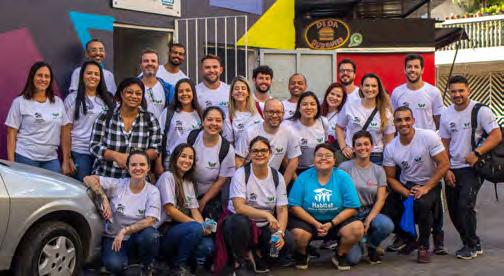



In 2022, Wesco launched our centennial build-a-thon in partnership with Habitat for Humanity. Wesco has a strong, ongoing engagement with Habitat for Humanity focused on employee volunteerism and supporting affordable housing in the communities we serve. We kicked off our centennial year with the goal of 100 builds across the globe in partnership with Habitat for Humanity. We reached our goal and celebrated while commemorating our inaugural Day of Caring.
Wesco’s Business Resource Groups (BRGs) have also made their mark on local communities around the world by contributing to various causes. In 2023, our BRGs donated to 18 different organizations, provided scholarships to four children of BRG members for pursuit of military service, trade school, or college and volunteered their time with additional philanthropic organizations.



We offer a wide range of sustainable products from the world’s leading manufacturers and help our customers determine the best solution to meet their sustainability goals. Key categories include:
• Energy-efficient products: Advances in lighting, motors, drives, transformers and our other mechanical products increase the ROI value proposition to install energy-efficient products, which continue to benefit our customers through reduced lifetime energy costs.
• Energy-management solutions: Our smart building solutions give better visibility and control of energy consumption and storage. These range from lighting and HVAC controls to advanced building automation and AI-driven monitoring equipment.
• Renewable energy products: We offer renewable energy solutions that include solar, electric vehicle (EV) charging infrastructure, energy storage solutions and micro-turbine wind.
• Sustainable maintenance, repair and operations (MRO) products: We have a broad range of sustainable MRO products to support green procurement goals.
• Workplace safety products: We offer a full range of products and equipment designed to help keep people safe in the workplace.
The Wesco Energy Solutions team is focused on turnkey LED lighting and controls upgrades to assist customers in realizing cost savings and sustainability goal achievement. The end-to-end service offering includes audit, design, procurement, project management, installation, rebate, commissioning, and post-installation warranty support.

For each project, we leverage our technology and supplier relationships while considering price, performance, aesthetics, cost of maintenance, warranty, product availability and manufacturer reliability and stability. Wesco Energy Solutions serves as a single point of contact throughout the lighting renovation and retrofit process, allowing our customers to easily implement energy-efficient solutions. Following a preliminary assessment, we conduct an onsite investment-grade audit of the facility being considered for an energy efficiency upgrade. Our detailed analysis of the audit’s findings results in energy- and cost-efficient designs and recommendations.
In addition to project implementation costs, we provide insights that enable our customers to make the optimal decisions in support of their business’s sustainability, branding, and financial goals and objectives. This includes:
• A detailed financial analysis, including a cost savings and payback periods.
• Energy reduction in kilowatt-hours saved, the equivalent greenhouse gas emissions eliminated, and the emissions-reduction equivalent in terms of trees planted and cars removed from the road.
• A line-by-line energy analysis of each proposed lighting fixture.
• Available utility rebates.
• Financing options.
Once a project is approved, we provide turnkey installation coupled with project life-cycle management services. This includes selecting and managing our installation partner(s), staging and storage of material, coordinating and securing rebates, recycling of the replaced fixtures and more.


Projects completed: 2,855
Area of Energy Efficiency Audits: 74M square feet
Rebates Back to Customers: $4M
Potential Customer Energy Savings: 84M kWh
Potential CO2 Emissions Avoided: 53,612 MTCO2e
Estimated Client Energy and Maintenance Savings: $13M
Our programs, services and solutions are designed for the dynamic and flourishing renewables market. Whether the focus is residential, commercial, or utility- scale solar, Wesco offers supply chain solutions supported by a leading product portfolio and expertise that is current with evolving market demands. Our solutions are scalable and adaptable to respond quickly and meet the needs of the industries we serve.
Selling and installing solar energy systems can be a complex process, but not with the right partner. Our team of dedicated in-house experts includes sales, project management, and inventory specialists. Additionally, our technical team offers engineering and design services customized to end user needs. In 2022, we opened our Solar Center of Excellence (COE) and in 2024, we are adding incremental resources to support our expanding services and offerings. The Solar COE is a centralized resource consisting of subject matter experts that can provide technical support, training, strategic sales guidance, project management, and business development to the greater Wesco sales organization and their customers. In its first year of operation, the Solar COE provided support to more than 100 Wesco sales reps in over 65 sales offices around the country.
In addition to our in-house expertise, we partner with the world’s industry-leading providers of renewable products and solutions, including manufacturers of photovoltaic modules, inverters, racking, the balance of systems, energy storage and EV chargers. Our strong partnerships combined with our expansive distribution network ensure our customers have the flexibility to quickly scale to ever-changing demands.
Whatever the geographic scope, we help customers expand their reach by leveraging our global footprint allowing service for projects at any scale. To complement our dedicated resources and product offerings, our supply chain value proposition includes everything from vendor-managed inventory to financing solutions.
Our team understands today’s complex supply chain and provides guidance throughout the project life cycle including business development, preconstruction and logistics, construction and installation and support and operations maintenance. Wesco offers materials management services including staging, on-site storage, kitting, cable management, code compliance and safety solutions. We also offer customized combiner boxes and PV assembly solutions to reduce our customers’ operating costs.
This combination of in-house expertise, product offerings and supply-chain solutions allow our renewables customers to remain focused on selling and installing solar energy systems. The result is increased profitability and reduced operating costs for our customers, more solar energy on the grid and solutions to keep our communities running smoothly and the world working smarter. In 2023, we worked with our customers to install solar products with more than 192 million kilowatt-hours of renewable energy generating potential. The amount of greenhouse gas emissions avoided is equal to the emissions from:
• 15,092,755 gallons of gas consumed
• 147,820,780 lbs. of coal burned
*Equivalencies based on the EPA Greenhouse Gas Equivalencies Calculator
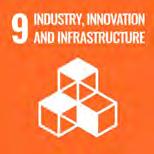
Solar Center of Excellence was founded to provide technical support, training, strategic sales guidance, project management and business development to the sales organization and their customers.
Our supply chain mission statement prioritizes safety, sustainability, supplier diversity and supplier transparency. It is a business imperative that Wesco remains a supplier of choice for our customers. Our Executive Vice President of Global Supply Chain and Operations provides quarterly updates to our Board of Directors on the mission-critical safety, health and sustainability of our supply chain.
We purchase products from a diverse group of suppliers, most of whom are headquartered in North America and manufacture products around the world.
Wesco is committed to protecting human rights, safeguarding health and safety standards, and promoting environmental responsibility across our supply chain. To this end, we require our suppliers to maintain safe and fair working environments for their workers, meet the requirements of the Wesco Supplier Code of Conduct, and comply with all applicable laws.
Our Supplier Code of Conduct and contractual terms set our expectations for human rights, health and safety, environmental responsibility and business ethics and integrity. We expect our suppliers to adhere to our standards in their operations. Our Business Integrity Line is available for employees, suppliers and outside parties to report any unethical conduct in our supply chain.
To help us evaluate supplier performance against our expectations and better understand the sustainability and risks in our supply chain, we conduct a supplier sustainability survey biennially. The survey questions cover conflict minerals, environmental performance, human rights and employee and supplier diversity.
Wesco’s Approach to Supplier Engagement and Continuous Improvement
We follow a risk-based approach whereby we proactively and continuously identify and evaluate the risks within our supply chain. Based on changes in the risks, we adopt appropriate criteria and standards for supplier selection, including contractual obligations and performance metrics.
We have high expectations of corporate responsibility and environmental sustainability performance. To ensure our suppliers understand what we require, suppliers are expected to review and commit to the Wesco Supplier Code of Conduct.
We evaluate supplier compliance, human rights and environmental sustainability performance in numerous ways, including surveys, self-assessments, site visits and third-party audits. In December 2023, we launched a campaign to survey our top suppliers in terms of human rights and environmental sustainability performance.
In 2023, we worked with UL Solutions, an independent, third-party auditor, to perform sourcing reviews at 75 facilities around the world that manufacture products for our private label offerings. Responsible sourcing audits focus on the following topics:
Labor Practices:
• Abuse, Coercion, Harassment, Disciplinary Action
• Benefits
• Child Labor, Young Workers, Apprentices/Trainees
• Discrimination
• Forced, Bonded, Indentured, Slave, Prison Labor
• Freedom of Association and Collective Bargaining
• Hiring and Termination
• Remuneration
• Working Hours
Health and Safety:
• Accidents
• Chemicals and Hazardous Materials
• Electrical
• Emergency
• Equipment Safety
• First Aid
• Personal Protective Equipment (PPE)
Other Topics:
• Facility Supply Chain Profile
• Ethics and Business Integrity
• Management Systems for Grievance


Following these responsible sourcing audits, 54 factories were required to implement a corrective action and preventative action plan (“CAPA”) to address noncompliances. Steps to remediation may include simple actions (such as clearing a blocked exit path) or more complex requirements (such as implementing new company procedures or building new health and safety infrastructure). We require suppliers to address critical or high-risk findings immediately. Depending on the severity, will stop purchasing from the supplier until the issue is resolved. Through our CAPA process, we strive to ensure that our suppliers continuously improve their performance, as we work towards building a more responsible and sustainable supply chain.
Wesco is committed to continuous improvement in our approach to responsible sourcing, as we look to deploy new strategies and technologies to expand the scope and depth of our responsible sourcing program. Please also see our Ethics and Compliance section for a list of policies relevant to our suppliers, including our Supplier Code of Conduct, along with the Data Privacy and Cybersecurity section for more information on supplier data protection.
At Wesco, we are dedicated to building a diverse and inclusive culture and are choosing business partners who share our values. Headed by our Director of Supplier Diversity Sales and Sourcing, we are committed to growing our Supplier Diversity Network in size and spend and expanding our Diversity Alliance Network.
We have defined our mission, goals and strategy surrounding supplier diversity. In 2023, we invested in a strategic partnership with a recognized third party to implement a supply chain management tool that identifies, confirms third party certifications, and connects us with diverse suppliers. This tool provides line of sight to the supplier business profile and has enhanced our diverse supplier spending reporting.
Together, we will:
• Increase our portfolio of vetted, third-party diverse suppliers across the enterprise.
• Drive growth and inclusion by fostering long-term partnership with our customers through a robust and diverse supply chain, while delivering our comprehensive and proven technology solutions.
• Support diverse business enterprises throughout our supply chain operations.
Membership Organizations
Our memberships with the following national business, civic, and trade organizations strengthen our efforts and yield best practices for identifying and developing new relationships:
• National Minority Supplier Diversity Council (NMSDC) Membership
• Disability:IN
• Canadian Council for Aboriginal Business (CCAB) Membership
As our supplier diversity efforts mature, we are establishing new efforts internally and externally.
Within Wesco, we have initiated a Supplier Diversity
All Star award for employees supporting our goals and have partnered with business resource groups supporting internal diversity goals. In 2023, we continued expanding communications, including a dedicated page on our website and a highlight of our goals on social media channels.
Additionally, through internal and external communications channels we have featured diverse companies in support of driving awareness and growing our Supplier Diversity spend at Wesco.
Minority-, Women-, Aboriginal-, People with Disabilities-, LGBTQ, Veteran- and Service-Disabled Veteran-Owned businesses.
• 2023 Diversity Suppliers: 2,424
• 2023 Diversity Spend: $370M
• 2023 Diversity Alliance Network Sales: $240M
*All self and third-party certified minority, women, veteran, disabled, disadvantaged, 8(a), HUBZone, LGBTQ, Aboriginal and diverse smallbusiness enterprises validated through third-party organizations.
Wesco has developed and maintained a strong relationship with over 2,424 diverse suppliers. Beyond supporting Wesco, we partner with these diverse business enterprises to create growth opportunities. We make connections between our suppliers and customer requests to support diverse spend.
Our team hosted two Supplier Diversity Summits in July and November 2023. These summits bring together key customers to share their insights and experience with supplier diversity. Presenting at the Supplier Diversity Summit brought additional awareness to seven diverse suppliers and strategic resellers by giving them a platform to reach a wide audience. During the July summit, attendees had the opportunity to hear from one of Wesco’s large customers about their Supplier Diversity Program, highlighting why supplier diversity is good for business.
Hearing directly from a customer regarding the importance of supplier diversity enabled Wesco associates to better grasp the business case for supplier diversity, creating many additional supplier diversity advocates within our employee base.
Since the Summit’s inception in 2021, we have continually increased attendance at the event. In 2023, both live virtual events grew to around 1,500 or greater attendees. At Wesco, we work to increase business opportunities for our customers who are diverse business enterprises. The Wesco Diversity Alliance (DA) program is a network of trusted and vetted third-party certified companies. The supplier diversity team provides DA partners the opportunity to capture public and private spending designated for diverse business enterprises, including access to available government work. In 2023, our Diversity Alliance Program supported sales totaling approximately $240 million.
Wesco donated $25,000 to the Diverse Supplier Grant Initiative; a program aimed at breaking down barriers for historically underrepresented companies in the business landscape.
For many small businesses, meeting industry compliance standards can be financially daunting. This Grant Initiative, targets small, emerging, and diverse owned businesses including, Black, Hispanic, and Latino-owned businesses, offering funding for these essential compliance measures.
In 2023, 407 companies have expressed interest in the initiative, with a total of 110 submissions since its inception in April 2022. Seven companies are currently undergoing underwriting evaluation, representing a total value of $5M.
The initiative’s active pipeline includes 24 companies in early-stage review, poised to undergo the investment approval process. 43% of applicants employ fewer than 10 individuals, underscoring the initiative’s impact on small businesses.
“Wesco is a proud supporter of the Diverse Supplier Grant Initiative, sponsored by JPMorgan Chase & Co.” - Terry Bender, Vice President Sales – Global Accounts


Federal, state, and local governments actively seek to award business to small and disadvantaged companies, particularly those owned by women, minorities, veterans and persons with disabilities. Unfortunately, many of these companies do not have the resources needed to identify and pursue these opportunities on their own.
Through our Government Partner Network (GPN), our personnel work with Wesco small and disadvantaged business customers (defined as businesses at least 51% owned by one or more individuals who are socially and/ or economically disadvantaged) to help them secure government business. We help to identify potential opportunities to fit their product and service offerings.
For those opportunities that stretch beyond the capabilities of a network member, we work with the customer directly or facilitate other business arrangements with appropriate Wesco customers and suppliers. This leverages their respective strengths to compete more effectively for the business, which would not be possible without the connections provided through GPN.
A core component of the program is the annual GPN Summit, where we convene GPN partner members including customers, vendors, and Wesco specialists for educational workshops on government procurement practices, networking opportunities, and charity fundraising to benefit a selected cause.
Our Wesco government team annually hosts a networking event for the Government Partner Network (GPN) members and key Wesco suppliers. The event allows members to connect with Wesco suppliers and our team to discuss and explore government opportunities. In 2023, we held our event on November 14-16 in Orlando, Florida with 134 attendees. At the event, we raised over $5,000 for The Folded Flag Foundation, a 501(c)(3) organization that provides educational scholarships and support grants to the spouses and children of the U.S. military and government personnel who died as a result of hostile action or in an accident related to U.S. combat operations. Additionally, attendees participated in a community service project in partnership with A Gift for Teaching to distribute 200 backpacks packed with a total of 3,600 supplies for students in Orange and Osceola counties as the primary source for free school supplies to teachers for students who need them most.
In 2023, we engaged with supplier partners and customers through electronic data interchange (EDI). Using EDI with our suppliers and customers allows us to streamline and automate manual documents in the order-to-cash and procure-to-pay business cycles.
We will continue to leverage automation in all areas of our supply chain, including electronic procurement with customers and suppliers as well as consolidating our legacy Wesco and Anixter platforms in 2024 and beyond.
The Wesco Lean Quality Management System (LQMS) provides global support to all business divisions and segments through a variety of services by the global quality team. The system covers approximately 600 operational locations globally; this fluctuates depending on organizational strategy and real estate consolidations. A commitment to continuously improving our processes and maintaining the best quality practices underlines our focus on being the key player in the market as well as meeting or exceeding our customers’ expectations. The following is a list of tools and offerings that support our LQMS:
• Global quality manual
• Quality procedures
• Standard operating procedures
• New business and on-site customer audit support
• Global on-site training and support for LQMS functions
• Continuous employee education in LQMS best practices
Wesco and subsidiaries currently have over 60 ISO registrations across ISO 9001, 14001, 45001 and AS9100/9120. In 2023, the LQM team conducted 96 total audits against these standards. The areas of focus for these audits covered the following: safety, operational and sales process adherence, policy compliance, inventory controls and accuracy, continuous improvement methodology and customer satisfaction.


Bobby J. Griffin Former President International Operations Ryder System, Inc.


A.





Sundaram Nagarajan President and Chief Executive Officer of Nordson Corporation

Easwaran Sundaram Operating Executive Tailwind Capital

Steven A. Raymund Former Chairman and Chief Executive Officer Tech Data Corporation

Laura K. Thompson Former Executive Vice President and Chief Financial Officer The Goodyear Tire & Rubber Company
Diverse directors in terms of gender, race or ethnicity: 60%
Female directors: 30%
Directors with diversity in terms of race: 40%
Audit, Compensation and Nominating & Governance Committee Independence: 100%


The Board is committed to supporting the company’s efforts to conduct its business in a principled, transparent and accountable manner. The Board believes that its effective oversight of ESG matters is central to its risk oversight function. The Nominating and Governance Committee is responsible for oversight of significant ESG matters, and the Audit and Compensation Committees are delegated responsibility for oversight of specific ESG topics. The Board receives regular updates from each of the Committees and retains ultimate oversight responsibility for ESG matters.
70% of Board of Directors with environmental, climate and sustainability experience. Defined by experience or expertise working within or overseeing the sustainability function of an organization, or having educational training on relevant environmental, social, and governance related topics.
70% of Board of Directors with human capital, talent, inclusion and diversity experience. Defined by experience working within or overseeing the human resources function of an organization, addressing compensation, benefits, talent, culture, and inclusion and diversity topics.
Receives regular updates from each of the Committees and retains ultimate oversight responsibility for ESG matters.
Responsible for:
• Business Ethics
• Cybersecurity
• Regulatory Compliance
• Legal Compliance
Also responsible for ESG-related impacts on our financial reporting and ESG-related disclosures.
Responsible for:
• Human Capital Management
• Talent
• Human Rights
• Labor Standards
• Health & Safety
• Inclusion and Diversity
Also responsible for programs and policies related to the foregoing topics.
Responsible for:
• Shareholder Rights
• Board Structure
• Climate Change Impact
• Waste, Water and Energy
• Supply Chain Transparency
• Product Lifecycle Management
Also responsible for oversight of significant ESG matters not delegated to another Committee.
ESG Management Teams work with senior leaders to set strategy and develop goals to embed sustainability and ESG objectives across our organization.
Wesco is firmly committed to operating with the highest levels of ethics and integrity. This commitment is reflected in our global ethics and compliance program, built on four pillars: (i) continuous risk assessments to address ethical and compliance risks, (ii) written standards that set out expected behaviors for employees, managers and other stakeholders, (iii) training and communications to convey expected behaviors, and (iv) monitoring through the use of internal reporting channels, investigations and audits.
Our ethics and compliance program operates under the leadership of the Chief Ethics and Compliance Officer (CCO). The work of the CCO is directly supported by Regional Compliance Officers worldwide. The Executive Compliance Committee provide high-level oversight of the program, comprised of Wesco’s chief executive officer, chief financial officer, chief human resources officer, general counsel, and vice president of internal audit and chaired by the CCO. The CCO also provides regular program updates to the Audit Committee of Wesco’s Board of Directors during its regular meetings.
The Wesco Code of Business Conduct (the Code) is the foundation of our ethics and compliance program, setting forth standards and guidance for conducting business with the highest degree of honesty and integrity. It defines the basis for decisions and actions across a range of matters, including preventing corrupt business practices, avoiding conflicts of interest, fostering non-harassment and non-discrimination, and protecting personal and corporate data and information. It applies to everyone associated with Wesco – all directors, officers and employees of its subsidiaries – helping us all comply with the laws and ethical principles governing our business. In many cases, the Code requires higher standards of ethical conduct than what is required by law.
We reinforce the principles articulated in the Code to our employees through training and regular communications in local languages. As of 2024, all Wesco employees are annually required to complete Code training and certify that they have read, understand, and agree to comply with the Code. Additional compliance training is also provided to employees based on risks identified in their job roles on topics such as anti-bribery and anti-corruption, conflicts of interest, preventing counterfeit products in our supply chain, and protection of human rights and prevention of modern slavery and human trafficking.
Acting on our principles and speaking up about potential violations of our Code, related company policies and the law is required of all employees. Updated in 2023, Our Business Conduct and Duty to Report Policy describes how employees can report legal or ethical concerns and the measures we take to investigate and address such reports. Our Antiretaliation Policy establishes our promise that those who report issues or concerns will be protected from retaliation.
Wesco provides multiple channels for employees to seek advice and help on ethics and compliance issues. They are encouraged to discuss the issues with a member of management or human resources. Wesco also provides an option for around-the-clock anonymous reporting through the Wesco Business Integrity Line (unless prohibited by local law). Wesco’s Business Integrity Line website and web intake form were also upgraded and reintroduced to our employees through a communications campaign launched in 2023.
As we continue to grow and develop our business, we are committed to continuously evaluating and improving our ethics and compliance program. The ethics and compliance office leads an annual review of the Code and related policies to ensure we effectively address and communicate our standards to internal and external stakeholders. Changes are made to the program periodically based on new or updates to existing, applicable laws, emerging and shifting risks and compliance-related trends.
The following list provides an overview of our key ethics and compliance program elements, and additional information can be found in the linked policies and on Wesco.com. Ethics and compliance issues that may be out of the scope of our normal operations that are not covered by a specific policy or program are addressed on an individual basis. When appropriate, we create a new policy, training program, or other proactive measure to address the issue.


Global Anti-Bribery and Corruption Policy
Defines the basis for decisions and actions across a range of matters, including preventing corrupt business practices, avoiding conflicts of interest, fostering non-harassment and non-discrimination, and protecting personal and corporate data and information. It applies to everyone associated with Wesco - all directors, officers and employees of its subsidiaries – helping us all comply with the laws and ethical principles governing our business. In many cases, the Code requires higher standards of ethical conduct than what is required by law.
Global ethics and compliance policy that articulates Wesco’s zero-tolerance approach to corrupt business practices. It establishes a framework to prevent and combat bribery and corruption by promoting integrity, transparency, and ethical business practices within Wesco.
Human Rights Policy
Internal Audit Program
Articulates Wesco’s commitment to adhering to business practices aligned with the principles outlined by the United Nations Global Compact, Universal Declaration of Human Rights, UN Declaration on the Rights of Indigenous Peoples (UNDRIP), OECD Guidelines for Multinational Enterprises.
Wesco’s internal audit department performs periodic assessments of location branches, distribution centers, and enterprise-level processes and controls to ensure compliance with our policies. In 2023, 84 operational audits were conducted with satisfactory results. Management implemented Internal Audit’s recommendations where appropriate. The internal audit group is also directly involved with the Chief Compliance Officer (CCO) reviewing reported or suspected unethical behavior. It also assists the CCO in conducting special investigations to help enforce the Code of Business Conduct.
Business Conduct and Duty to Report Policy
Our ethics and compliance policy that articulates that all Wesco directors, officers and employees are expected to follow high standards of business and personal ethics while carrying out their job responsibilities. It requires all employees to disclose violations of the Code, related policies, or the misappropriation of Wesco funds or assets. It also provides clear instructions on how to use the numerous channels for reporting issues or concerns.
Anti-Retaliation (Whistleblower) Policy
Anti-Fraud Program
Policy designed to create a safe and transparent work environment where employees feel comfortable reporting concerns or participating in internal investigations without fear of reprisal.
Fraud in any form is not tolerated at Wesco. We fully investigate any suspected acts of fraud, misappropriation, or other similar irregularity regardless of a person’s position, title, length of service, or relationship with the company. Anti-fraud guidelines are included in both our Code of Business Conduct and Supplier Code of Conduct. Wesco maintains a robust internal control environment to prevent and detect fraud. Local management serves as the first line of defense in the company against fraud. Senior management, including the corporate controllership, quality assurance, the Vice President, Corporate Ethics and Compliance, and others formulate a second line of defense to prevent and detect fraud. Finally, internal audit, reporting independently to the Audit Committee of the Board of Directors, conducts audits and other reviews of controls and business processes with an obligation to use its expertise to identify trends and patterns that might suggest fraud.
Diverse Business
Contracting Compliance
Supplier Code of Conduct
Business Partner Anticorruption Policy
Wesco supports the growth and development of qualified minority, women and disadvantaged business enterprises (MWDBEs). Our Diverse Business Contracting Compliance Policy helps ensure that we are complying with applicable laws and regulations concerning MWDBE participation on government-funded projects. We are committed to the legitimate participation of properly certified MWDBEs that can and will perform a commercially useful function on the public projects in which they participate.
The Supplier Code of Conduct clarifies Wesco’s expectations of ethical and responsible corporate business practices for its suppliers. It requires suppliers to conduct their business in compliance with all applicable laws, including those related to employment, protection of human rights, data privacy, health and safety, environmental protection, anticorruption, antitrust and trade sanctions. It also requires suppliers to adopt management systems, policies, procedures, and training to uphold the ethical and legal standards and expectations outlined in it within their business operations.
Wesco policy that applies to all suppliers of products or services to Wesco. It extends Wesco’s zero-tolerance for corrupt business practices to its supply chain by strictly prohibiting anyone acting on behalf of Wesco, whether directly or indirectly, from making or receiving improper payments, or engaging in any form of corrupt business practices.





Cybersecurity and data protection is an enterprise wide priority and is reflected in engagements with our customers and suppliers. Our comprehensive approach to securing our data and business systems from attack, compromise, or loss includes a combination of leading technologies, policies and procedures and a 24/7 cybersecurity operations team monitoring our environment for signs of attack and responding in real time.
We conduct mandatory information security awareness training for our employees at least annually and enhanced training for specialized personnel. We have instituted regular attack or malicious activity simulations for employees to enhance awareness and responsiveness to such possible threats, and we also employ third parties to perform penetration and vulnerability tests.
Our security policies are evaluated and updated annually to address changes in the regulatory and threat landscapes and evolving best practices. We identify potential cybersecurity risks using internal measures and external resources. Identified risks are captured and prioritized on our risk register. Results are regularly reported back to a cross-functional, executive cybersecurity risk committee which then validates risks. While we focus heavily on prevention
and detection, response and recovery plans, service agreements and partner engagements are in place should there be a need for us to respond to an attack. We have adopted a security incident response plan that provides controls and procedures for timely and accurate reporting of material cybersecurity incidents. We also maintain cyber liability insurance coverage.
To more effectively prevent, detect and respond to information security threats, we have a dedicated Chief Information Security Officer whose team is responsible for leading enterprise-wide information security strategy, policy, standards, architecture and processes. As part of its oversight of cybersecurity risk, the Audit Committee of our Board of Directors meets at least quarterly with our Chief Information Security Officer, Chief Information and Digital Officer and other senior leaders to receive updates on cybersecurity risks and threats, the status of initiatives to strengthen our information security systems and management’s assessments of our security program. Wesco has achieved ISO 27001 certification for its Information Security Management System.
With these security measures in place, we did not experience any material data breaches in 2023. We also finalized our planned three-year infrastructure and security integration between Wesco and Anixter, making significant progress in Zero Trust configuration and data loss prevention implementation.
Unless otherwise stated, this report covers activities, data and initiatives from our fiscal year 2023.
The topics covered in this report include those that we have determined to be material for our business and stakeholders as noted on page 12. Wesco aligns with several ESG frameworks and disclosures in support of our commitment to transparency and our fulfillment of stakeholder needs and expectations. We leverage the following frameworks and standards to provide robust ESG information disclosure:
• Global Reporting Initiative (GRI): GRI offers a list of global standards and guidelines around sustainability reporting.
• Sustainability Accounting Standards Board (SASB): SASB provides a comprehensive set of industry-specific disclosure topics and guidelines.
• Task Force on Climate-Related Financial Disclosures (TCFD): TCFD provides disclosure recommendations on thematic ESG topics such as governance, strategy, risk management, metrics and targets to provide stakeholders with fuller information surrounding climate risks.
• CDP: Formerly the Carbon Disclosure Project, CDP is an international organization that helps companies and cities measure and disclose important environmental impact information through an annual questionnaire and rating system.
• United Nations Global Compact (UNGC): UNGC is an initiative that aims to help businesses align their strategies and work toward the U.N.’s Sustainable Development Goals.
• United Nations Sustainable Development Goals (UN SDGs): UN SDGs provide a shared set of 17 goals toward peace and prosperity for people and planet goals and create a call to action by all countries in a global partnership.
We also regularly engage with our investors, employees, customers, regulators, ratings agencies and others on ESG and business issues. Additional information about Wesco can be found in our public financial filings— including our annual report and proxy filings—as well as on the Security and Exchange Commission’s website at www.sec.gov or on the Investors page of our website at Wesco.com.
Wesco plans to continue to report annually as we monitor, measure, and deepen our ESG initiatives and disclosures.
Wesco endorses the United Nations Sustainable Development Goals (SDGs), which are a call to action to end poverty, protect the planet, and ensure that all people enjoy peace and prosperity. We have prioritized the following five goals:





More information about our SDG aligned initiatives is included throughout this report.
We did not seek third-party assurance for this report; however, we will consider doing so for future reporting. The information and data contained in this report was vetted by internal subject matter experts on the various ESG topics included in this report.
We appreciate and welcome feedback on our ESG initiatives and reporting and invite you to contact us directly via email at Sustainability@wescodist.com

Corporate Industry Leadership:
Barron’s 100 Most Sustainable U.S. Companies: #96 of 100
Bloomberg’s Gender Equality Index (2019, 2020, 2021, 2022, 2023)
CSO/Foundry: CSO50 Awards
Data Centre Magazine: Top 10 Data Centre Cabling Experts (Wesco #3, Rahi #7)
Drucker Institute/Wall Street Journal: Top 250 Best Managed Companies: #204
Electrical Wholesaling: Top 150 Ranking #1
Forbes America’s Best Large Employers: #478 of 500
Forbes America’s Best Mid-Sized Companies: #76 of 100
Fortune 500: #181 of 500
Fortune’s World’s Most Admired Companies: #4 in Diversified Wholesalers
Industrial Distribution: Big 50 List #7
Latino Leaders Magazine Best Companies for Latinos to Work
Modern Distribution Management: Top Electrical, Data & Security Distributor #1
Pan Finance - Most Innovative Supply Chain Solutions – North America
Pittsburgh Business Times - C-Suite Awards – David Schulz CFO
USA TODAY - America’s Climate Leaders 2023: #9 in Industry: Capital Goods
Innovation:
AV Awards - Distributor of the Year (finalist)
Broadband Communities: Fiber-to-the-Home Top 100 (TVC and Maxcell)
Cabling Installation & Maintenance Innovators Award (Innovation Center)
Dominion Energy Momentum 2023 Sustainable Partner Award
InfoComm Best of Show Winner (Liberty AVoIP)
Rockwell 2023 Distributor Innovation Award (EESCO)
Security InfoWatch “Security Innovators” (Tara Dunning)
SIA Women in Security Forum “Power 100” (Tara Dunning, Laura Garest, Sarah Rendich)
Supply Chain Excellence:
Capital Finance International: Most Sustainable Supply Chain Strategy - U.S.
Institute for Supply Management Supply Chain Trailblazer Award, Advanced Technology Digital Impact
Institute for Supply Management 30 Under 30 Rising Supply Chain Stars (Julie Rotunda)
Supply & Demand Chain Executive: Top Supply Chain Projects Award
Supply & Demand Chain Executive: Women in Supply Chain (Leslie Malloy)
Supplier Partnership:
Axis Distributor of the Year
Duquesne Light Supplier Diversity Excellence Award
Johnson Controls Agility & Supply Chain Continuity Supplier Leadership Award

Organizational details
Entities included in the organization’s sustainability reporting
Reporting period, frequency and contact point
Restatements of information
External assurance
Name of the organization: WESCO International, Inc. Location of headquarters: Pittsburgh, Pennsylvania, USA Ownership and legal form: Wesco International is a publicly traded (NYSE: WCC) Fortune 500 holding company Location of operations: Branch Locator
See About Wesco on page 8 and About This Report on page 58
Reporting period: 2023 Frequency: Annual Contact: Sustainability@wescodist.com
Wesco has updated a previously stated value for 2021 Leased Fleet emissions, see page 17.
Wesco has updated previously stated values for 2021 Car and Truck, and 2022 Truck Fleet MPG, see page 20.
We did not seek third-party assurance for this report. The information and data contained in this report have been vetted by internal audit personnel with subject matter expertise on the topics on which we have reported. Below are the material topics for our reporting. Additional information about impacts and boundaries can be found in the respective sections.
Activities, value chain and other business relationships
2-12 Employees
Workers who are not employees
Governance structure and composition
See Wesco Business Segments on page 10
See Supply Chain on page 48
Automation Electrical Maintenance Repair and Operations, Broadband Communications, Electronics, Renewables, Data Communications, Lighting, Safety, Security, Wire, Cable and Conduit
Sustainable Products and Services:
• Energy efficient products
• Energy management products
• Renewable energy products
• Sustainable MRO products
• Workplace safety products
Significant changes to previous reporting period - No
See People on pages 33-36
See Employees by Type on page 34
See Governance on page 52
2024 Proxy Statement on pages 5-21 Directors and Officers Board Committees
Nomination and selection of the highest governance body
Chair of the highest governance body
Role of the highest governance body in overseeing the management of impacts
Nominating and Governance Committee
See 2024 Proxy Statement on pages 5-19.
See 2024 Proxy Statement on page 5
See Corporate Governance on page 52
See Enterprise Risk Management on page 39
The process of consultation is delegated from the Board of Directors to senior management, which annually reviews the results with the Board. The Board of Directors conducts an annual strategy review, which includes updating the organization’s purpose, value, mission, and goals related to economic, environmental, and social topics. As delegated to them by the Board, management is responsible for identifying and managing economic risks and opportunities that affect the enterprise. The Board delegates the management of these risks to senior management. As delegated to them by the Board, management is responsible for reviewing the effectiveness of the risk management process, which includes reviewing risks related to economic and environmental processes. Our ESG management teams report to the Board annually on the status of our ESG programs and sustainability goals progress.
2-13
Delegation of responsibility for managing impacts
2-14
2-15
2-16
2-17
Role of the highest governance body in sustainability reporting
Conflicts of interest
Communication of critical concerns
Collective knowledge of the highest governance body
Evaluation of the performance of the highest governance body
Remuneration policies
Process to determine remuneration
2-21
Annual total compensation ratio
Statement on sustainable development strategy
See Governance on page 52
See 2024 Proxy Statement page 21
The Board of Directors has delegated authority to members of senior management for economic, environmental, and social topics. Our Executive Vice President of Global Supply Chain and Operations and our Executive Vice President of Human Resources report to our Chairman and CEO.
The chairman of the board reviews the sustainability report.
Code of Business Conduct
Contact Our Board
Corporate Governance Guidelines
Corporate Governance Guidelines
See 2024 Proxy Statement on pages 27-29; 37-65
See 2024 Proxy Statement on pages 37-65
See 2024 Proxy Statement on page 61
See CEO Letter on pages 6-7
Policy commitments
Embedding policy commitments
Processes to remediate negative impacts

We evaluate environmental impact in our decision-making processes and have embraced the Precautionary Principle. Wesco Guidelines, Charters and Policies
See Policy Reference within Ethics and Compliance on page 54
See Governance on page 52
See Code of Business Conduct
2-27
Mechanisms for seeking advice and raising concerns
Compliance with laws and regulations
Membership of associations
Approach to stakeholder engagement
See Ethics and Compliance on page 54
See 2023 Annual Report, Item 3
We are members of several industry groups to share our knowledge and expertise and learn from our peers and ensure that we are present and participating in the communities in which we live. We are members of the following organizations:
• Allegheny Conference on Community Development
• Electric Utility Industry Sustainable Supply Chain Alliance
• Institute of Supply Management
• National Association of Electrical Distributors
• National Association of Manufacturers
• National Association of Wholesaler-Distributors
• Responsible Business Alliance
• United Nations Global Compact
See Reporting and Materiality on page 14
See 2024 Proxy on pages 21-22
Employees
Customers
Suppliers
Stockholders
Communities
Collective bargaining agreements
3-1
Process to determine material topics
2% of our employees were covered by a collective bargaining agreement in 2023
See Reporting and Materiality on page 14
For this report, we relied on the following inputs:
• Customer surveys of our sustainability progress
• Employee surveys and other feedback mechanisms
• Feedback from customers, employees, suppliers, nongovernmental organizations and other stakeholders on prior sustainability reports
• Topics evaluated by external ranking organizations, such as CDP and EcoVadis
• Insight from our senior leaders
• Our enterprise risk management process
• Applicable government regulations
• Priorities of industry associations in which we participate
See Reporting and Materiality on page 14
List of material topics
Supply Chain, Energy, Waste, Emissions, Health and Safety

Proportion of spending on
Not applicable. We work with approximately 50,000 suppliers located around the world that provide products to our roughly 800 branches.
Reductions in energy requirements of products and services
See Energy on pages 18-20
See Energy on pages 18-20
See Energy on pages 18-20
See Sustainable Products and Services on pages 46-47
Energy-efficient products: Advances in lighting, motors, drives, transformers, and other mechanical products that we sell make it affordable and cost-effective to install energy efficient products.
Energy-management solutions: Our smart building solutions give better visibility and control of energy consumption. These range from simple and cost-effective lighting and HVAC controls to advanced building automation and monitoring equipment.
Renewable energy products: We offer turnkey renewable energy solutions that include solar and micro-turbine wind. Sustainable MRO products: We have a broad range of sustainable maintenance, repair, and operating products to support green procurement goals.
Workplace safety products: Through our Conney Safety and Hazmasters divisions, we offer a full range of products and equipment designed to help keep people safe in the workplace.
See Emissions on page 73
See Emissions on page 73
See Emissions on page 73
See Emissions on page 20
See reduction target on page 16
403-5
403-6
Waste generation and significant waste related impacts
Management of significant wasterelated impacts
Waste generated
Waste diverted from disposal
Waste directed to disposal
403-8
Occupational health and safety management system
Hazard identification, risk assessment, and incident investigation
Occupational health services
Worker participation, consultation, and communication on occupational health and safety
Worker training on occupational health and safety
Promotion of worker health
Prevention and mitigation of occupational health and safety impacts directly linked by business relationships
Workers covered by an occupational health and safety management system
See Waste on pages 21-22
See Waste on pages 21-22
See Waste on page 22
See Waste on pages 21-22
See Waste on pages 21-22
403-9
403-10
Work-related injuries
Work-related ill health
See Health and Safety on page 37
See Health and Safety on page 39
See Health and Safety on page 41
See Health and Safety on pages 40-41
See Health and Safety on page 41
See Health and Safety on page 29
See Health and Safety on page 39
See Health and Safety on page 37
The Occupational Health and Safety System covers all employees, contractors and others working on behalf of Wesco
See Health and Safety on page 38
See Health and Safety on page 38
Accounting
CG-MR130a.1
CG-MR230a.1
(1) Total energy consumed (2) percentage grid electricity (3) percentage renewable
Description of approach to identifying and addressing data security risks
CG-MR230a.2
CG-MR310a.1
(1) Number of data breaches, (2) percentage involving personally identifiable information (PII), (3) number of customers affected
(1) Average hourly wage and (2) percentage of in-store employees earning minimum wage, by region
CG-MR310a.2
CG-MR310a.3
CG-MR330a.1
(1) Voluntary and (2) involuntary turnover rate for in-store employees
Total amount of monetary losses as a result of legal proceedings associated with labor law violations
Category/Unit
CG-MR330a.2
Percentage of gender and racial/ethnic group representation for (1) management and (2) all other employees
Total amount of monetary losses as a result of legal proceedings associated with employment discrimination

Quantitative: Gigajoules (GJ), Percentage (%)
(1) 822,062 GJ (2) 47% (3) 0%
Discussion and Analysis
See Cybersecurity and Data Protection on page 57
Quantitative: Number, Percentage (%)
(1) 0 (2) 0% (3) 0
Quantitative: Reporting Currency, Percentage (%)
Wesco does not disclose this information
Quantitative: Reporting Currency Quantitative: Rate
Legal proceedings are reported in our 2023 Annual Report, Item 3 (1) 15.4% (2) 7.3%
Quantitative: Percentage (%)
(1) (2) See 2023 Employee Demographic Data on pages 33-36
Quantitative: Reporting currency
Legal proceedings are reported in our 2023 Annual Report, Item 3
Product Sourcing, Packaging and Marketing
G-MR 410a.1
Revenue from products third-party certified to environmental and/or social sustainability standards
Quantitative: Reporting Currency
Wesco does not disclose this information
The Chemical Safety program establishes procedures to ensure chemical hazards are properly evaluated and communicated such that facility personnel can work with minimal or no risk to health.
Management and Supervisory Responsibilities Management provides overall support and resources for the program. Supervisors must ensure employees are properly trained and the program is implemented at the facility.
Employees HSE Responsibilities Employees must follow the outlined procedures for chemical management and inform management of any changes or concerns. Chemical Inventory A chemical inventory is available for hazardous materials handled on-site. Chemical hazard information may be grouped to aid in effective communication of hazard and control information.
CG-MR 410a.2
Discussion of processes to assess and manage risks and/or hazards associated with chemicals in products
Discussion and Analysis
Chemical Hazard Evaluation The use of individual chemical hazards should be evaluated for routine functions to assess potential exposures. Tasks which are unusual or non-routine are to be evaluated by a supervisor prior to work being performed to ensure proper controls are provided.
Labeling Systems All chemical containers are to be labeled in accordance with the Global Harmonization System (GHS) and are marked as to what they contain and the respective hazards.
Safety Data Sheets Data sheets for each chemical used onsite are obtained from the manufacturer or distributor and made available to all employees.
Training Employees are trained upon initial assignment and on a periodic basis thereafter regarding the chemicals used in the workplace.
CG-MR
CG-MR
CG-MR
Discussion of strategies to reduce the environmental impact of packaging
Discussion and Analysis
Wesco reduces waste by capitalizing on opportunities to reduce, reuse and recycle.
Wesco uses packaging products that have anywhere from 10-80% recycled content built into the base material. Many of these materials are also biodegradable.
At Wesco, most of all items such as corrugated, polybags, tapes, etc. are recyclable. We source sustainable materials such as dunnage, reels and boxes from paper/paperboard and wood. Many locations have cardboard balers and compactors to reduce the impacts in a landfill waste environment.
With the training of employees on recycling, we encourage using the minimal packaging necessary to protect and safeguard our products so as not to over tax the landfills.
Shipment Consolidation successfully used third-party transportation partners to collect, consolidate and ship products from the U.S. to Wesco and customer locations around the world. By leveraging multimodal transportation to consolidate supplier shipments, Wesco reduces operating expenses, increases material visibility and lowers carbon emissions.
Number of: (1) retail locations and (2) distribution centers
Total area of: (1) retail space and (2) distribution centers
Quantitative: Number
Quantitative:

Describe the board’s oversight of climate-related risks and opportunities.
Describe management’s role in assessing and managing climate-related risks and opportunities.
As part of our alignment with the TCFD, our Board of Directors oversees the integration of ESG principles throughout our enterprise. This includes oversight of enterprise risk. The Board of Directors receives a report on material ESG topics, including climate-related topics, at least on an annual basis and monitors risks that have been delegated to its three standing committees. As discussed previously on page 58 of this report, the Nominating and Governance Committee provides oversight on ESG strategy and risks. This oversight includes reviewing climate-related strategies, risks and opportunities and progress against emissions reduction targets. The Committee meets at least twice a year and reports out to the full board at each regular meeting.
The CEO reviews Wesco's climate and sustainability programs, goals and progress on at least an annual basis. Wesco's climate change strategy is managed by Wesco's sustainability team, which reports to Wesco’s Executive Vice President - Supply Chain & Operations who is a direct report to the CEO and serves as the liaison with executive officers regarding sustainability initiatives. The management team is responsible for annual reports to the Board of Directors on the status of Wesco’s ESG programs and progress against sustainability goals, including climate-related considerations.
The Director - Global Sustainability and Environmental Compliance, in collaboration with relevant business units, provides the daily management of climate change initiatives against Wesco’s stated goals. Wesco uses software platforms to manage and track energy and fuel consumption, which aids in our compilation of data and provides valuable insight into how we manage our climate impact.
In 2022, multiple members of management from across our organization – the Vice President of global real estate, the Senior Vice President and Treasurer, business development team and the global environmental management & sustainability team – were involved in the completion of Wesco’s inaugural climate risk assessment. They assisted in identifying climate-related risks and opportunities for the organization and provided information around risk management and mitigation plans.
Wesco has a management team that oversees the Enterprise Risk Management (ERM) process and is led by the Senior Vice President, Treasurer and the Vice President of Internal Audit. It includes at least 15 members representing business units and functional groups throughout the organization. Various team members rotate every two years to ensure a variety of risks and perspectives are considered in the process. Further, management provides an annual in-depth review of the ERM process and top risks to the Board.
More information on Wesco’s climate initiatives and structure can be found on pages 12-13.
Describe the climate-related risks and opportunities the organization has identified over the short, medium and long term.
Wesco performed a climate risk assessment to identify substantiative climate-related risks and opportunities. All substantiative risks, including climate-related risks, are generally outlined in the Risk Factors section of the Form 10-K.
Physical climate-related risks include:
• Disruptions to our own operations of global supply chain due to the impact of severe weather or natural disasters, including those occurring as a result of climate change, such as tropical storms, severe winter weather, flooding, drought or wildfires.
• The impact of long-term, climate-driven events such as rising sea levels and shifting precipitation patterns, may have an effect on land usage and energy costs.
Due to the global nature of our organization, these events could have an impact on our IT operations, distribution centers, our supply chain and transportation partners, Wesco employees and the power grids our facilities depend on. This could result in temporary or prolonged interruptions to our operations, increase our operations costs and capital expenditures and reduce revenue. These impacts could become more severe in the long-term as the frequency and intensity of natural disasters and other severe weather events increases due to climate change.
We also monitor the cost of compliance with evolving global laws and regulations relating to climate change and its impacts. The focus on climate issues by regulatory bodies globally could pose a risk if those regulatory bodies do not agree on the scope of requirements and the standard of how to report climate-related risks, or if complying with new regulations creates additional financial obligations. For example, a regulatory price on carbon could increase operating expenditures and manufacturing costs in the supply chain.
Wesco has also identified climate-related opportunities that include expanding its offerings of energy efficiency products and renewable energy products. As attention and interest grow for climate mitigation solutions, Wesco is well positioned to grow our business in these energy efficiency and renewable energy technologies and projects.
The movement toward energy efficient facilities and operations is another opportunity that can decrease our operating costs and increase our reputation as customers may see Wesco as an energy efficient partner.
Risks were analyzed along short, medium and long-term time horizons, generally assessed as 0-1 years, 1-5 years and 5+ years, respectively. Material risks were identified through a forwardlooking climate scenario analysis. The results of the climate risk assessment, including estimated likelihood of occurrence and impact of each risk is integrated into management plants to mitigate climate-related risks. Many climate-related risks were assessed as emerging to Wesco and are more likely to have long-term impacts rather than an immediate impact on the company.

Describe the impact of climate related risks and opportunities on the organization’s businesses, strategy and financial planning.
Wesco considers the effects of climate change on our business and it is our objective to develop a realistic transition plan based on product and service sustainability, supply chain management and environmental management.
Wesco has worked with its suppliers to identify low-carbon and energy-efficient products and services and to articulate the energy efficiency and carbon reduction potential of its goods and services to its global customers. We offer energy conservation measures (ECMs) which are products and services with the potential to be part of the low-carbon transition. For example, we support the adoption of green technology through our commercial solar implementation service, allowing our customers to rely on a stable source of renewable energy. These products are well positioned to become an even more important part of our business in the future.
We also assist our customers with emergency preparedness and response, including to climaterelated natural disasters. We work with our customers to enhance their resiliency and ability to respond to catastrophic events by building up replenishment resources and preparing contingency plans. Wesco constantly adapts, learning from past events and implementing changes to its emergency management protocol.
Wesco has conducted sustainability surveys among its top suppliers and this information has helped inform Wesco's supplier engagement strategy. We maintain a diverse global supply chain, allowing us to source from alternate vendors in instances of supply chain disruptions and are actively working to increase supply chain resiliency.
Wesco is also evaluating the energy efficiency of its own facilities and identifying efficiency measures and sharing best practices to then pass these improvements on to customers. Where feasible, Wesco retrofits facilities with energy efficient technology and has explored the potential for site-specific renewable energy and further expansion of our electric vehicle fleet. Wesco works to address climate change through measuring, disclosing and mitigating its greenhouse gas emissions. These efforts allow us to identify and implement energy and resource efficiency opportunities and strategies.
Describe the resilience of the organization’s strategy, taking into consideration different climate-related scenarios, including a 2°C or lower scenario.
In 2022, Wesco conducted a quantitative and qualitative climate risk assessment to drive our management strategy of climate-related risks. Due to our large global footprint and the high degree of business criticality of many of our facilities, we considered multiple scenarios from the IPCC and IEA to fully map potential impacts to our business.
We used the following scenarios from the Intergovernmental Panel on Climate Change:
• Representative concentration pathway (“RCP”) 8.5, which is a worst-case scenario in which emissions rise through the 21st century, with a worldwide average global temperature increase of 4˚ C in 2100
• RCP 4.5, which is an intermediate scenario where emissions peak in 2040, with an average global temperature increase of 2˚ C.
• RCP 2.6, considered a stringent mitigation scenario under which global warming is limited to under 2°C by the end of the century.
To complement RCP2.6, Wesco’s transition risks were analyzed under the IEA Sustainable Development Scenario (SDS). This scenario is compatible with an under 2°C goal, with advanced economies reaching net zero emissions by 2050 through adoption of stringent policies to increase efficiency and adopt renewable energy sources.
Although Wesco’s facilities are likely to face adverse physical climate events, we assessed our operations to have a high level of resiliency to current and future climate-related impacts. Climate risk is integrated into our enterprise-wide risk management strategy, allowing us to fare well through historic climate-related events and providing a range of adaptation measures against future events. As an organization, Wesco is in various ways resilient to the effects of climate change, weather hazards and the socio-economic implications of a transition to a low-carbon economy. A vital part of Wesco’s climate management strategy is our emissions reduction goal. By 2030, we plan to reduce our absolute Scope 1 and 2 GHG emissions by 30% from a 2021 baseline. Further details around our targets and current progress can be found on page 13 of this report.
Describe the organization’s processes for identifying and assessing climaterelated risks.
Describe the organization’s processes for managing climate-related risks.
Wesco integrated the results and assumptions of the climate risk assessment into the company’s enterprise risk management (ERM) process. This process helped management take an asset-level approach to assessing climate risk throughout our value chain. Multiple subject matter experts from across the company were involved, ensuring a thorough, enterprise-wide identification and assessment of risks.
Every two years, the management team conducting the ERM review performs a comprehensive review of potential risks with an update in the intervening year. During this process, potential risks are evaluated and rated on velocity, severity and probability to be placed on a heat map. Mitigation availability is also considered in the evaluation. Department heads are responsible for the identification and escalation of potential risks within their department on an ongoing basis.
Wesco annually reviews environmental programs, policies and data, including energy consumption and greenhouse gas emissions, to identify opportunities to improve efficiency and reduce emissions. At the asset level, Wesco works with branch management to identify improvement opportunities at facilities and the performance of delivery vehicles, which includes smart fleet technology.
When a supply chain risk arises, Wesco creates an automated survey which is sent out to the supplier base to understand the relevant risk of each supplier. Based on responses, Wesco assigns a relative risk to each supplier.
Wesco has already adopted a number of climate-related mitigation and adaptation measures to protect its personnel, assets and operations as part the company’s overall strategic risk management planning. The company maintains a high degree of adaptive capacity against potential climate impacts.
Wesco considers potential disruptions due to weather in our operational strategy and has mitigation plans in place for our facilities including:
• Designing the configuration of facilities to reduce the consequences of disasters and complying with all site-specific infrastructure requirements
• Maintaining insurance for our facilities against catastrophic risks, such as wildfire, tropical storms or other natural disasters
• Maintaining site-specific emergency response plans for our personnel and business sites in order to ensure business continuity and employee safety. These are audited regularly by the Wesco environmental health and safety team.
• Procedures for remote work during severe weather events or other disruptions
Wesco has a field-tested emergency action plan that is designed to provide guidance to employees and management to ensure the safety of Wesco employees during a natural disaster and in response to the aftermath. This is coupled with a business continuity plan that seeks to reduce disruptions to business activities. Wesco is in the process of adopting more systematic contingency planning for each facility, which are in varying stages of development and execution.
Further, Wesco assesses the risks of the supply base. Our supplier relations teams have regular communications with suppliers to understand their current threat level. For higher risk suppliers, this may entail more frequent communications. In addition, Wesco works with its suppliers on a regular basis to identify new products and services that can improve its customers' energy efficiency and help them reduce greenhouse gas emissions. We also maintain a diverse supply network to improve resiliency.

Recommendation
Describe how processes for identifying, assessing and managing climate-related risks are integrated into the organization’s overall risk management.
Recommendation
Disclose the metrics used by the organization to assess climate related risks and opportunities in line with its strategy and risk management process.
Disclose Scope 1, Scope 2, and, if appropriate, Scope 3 greenhouse gas (GHG) emissions and the related risks.
Wesco’s ERM process works with business leaders of key business units to outline a strategic plan of how to minimize identified risks. Our climate-specific risk assessment took an assetlevel approach to risk assessment reviewing our sites for loss prevention, including climaterelated severe weather impacts, to allow for further identification of potential prevention and mitigation actions.
Contingency planning considers risks impacting the availability of materials globally. A few exceptions exist for unique inventory. Locations identified as at high risk due to the potential for natural disasters or location along transportation routes take specialized steps and have higher levels of insurance coverage in case of incident.
We disclose waste and energy metrics on pages 18-20 of this report. We are actively working to reduce our environmental and climate impact.
In addition, Wesco offers a wide range of energy efficient products and services, as discussed on pages 49-51. We see these product and service offerings as an essential element of our business strategy to meet the increasing needs and emphasis on a sustainable economy.
Scope 1: 50,693.57 metric tons CO2e
Scope 2 (location based): 36,719.29 metric tons CO2e
Scope 3: Waste generated in operations: 10,177.49 tons CO2e
Wesco uses the EPA's WARM model to estimate lifecycle GHG emissions associated with landfilled waste. Wesco uses this calculation in part to continue to drive progress in its waste diversion rate, identifying new waste streams and third-party partners to reuse and recycle potential waste streams from Wesco operations (especially cardboard, wood pallets, plastic wrap and packaging materials).
Business travel: 8,396.04 tons CO2e
Wesco's third-party travel partner calculates the annual GHG impact of Wesco's air, rail and rental car use.
Describe the targets used by the organization to manage climate-related risks and opportunities and performance against targets.
Wesco has a 30% absolute reduction target for Scopes 1 and 2 GHG emissions from a 2021 baseline with a target year of 2030. Further, we have additional environmental goals discussed on page 13 of this report.


